#and was instead chosen to play on audience expectations of the style itself
Video
youtube
Jesse Tribble - Filming The Office
#this with ep 3 of Brian Baumgartner's podcast is super interesting#Jesse comments on the ways the office breaks the rules of documentary filming in order to preserve the rules of sitcom filming#and according to the show's DP Randall Einhorn that sort of choice was 1000% by design#also#tracking the influences of the documentary style choice is beyond compelling#evidently there were these docu-soaps covering aspects of mundane British life that inspired Merchant and Gervais#so the US team had to work without that point of reference when adapting the show with the American audience in mind#and then when you get to Parks#all these specific inspirations and creative compulsions are further abstracted#and the docu crew vanishes altogether#which ultimately gets us to 2019 where the mockumentary visual style is applied to hsmtmts without ANY of the original creative reasons#for choosing to shoot a sitcom like a documentary#and was instead chosen to play on audience expectations of the style itself#as well as for the 'theatre is an agreement between actor and audience to suspend disbelief' angle that I'm still working on#because if anything comes out the analysis of 'why jim look camera'#it's 'it makes him relatable' and 'it allows this character to make a specific comment on the goings-on'#and both of those results are achieved in using it on hsmtmts#so it's a good thing to use for their intended purposes#anyway I'm like 50% sure I'll end up writing this essay#outside of tags
3 notes
·
View notes
Text
High Guardian Spice Redo
I know Crunchyroll’s new series High Guardian Spice has gotten…less than favourable reviews and criticism with some people even rewriting some scenes or redesigning the characters. Thought I might give it a try.
Make the show a magic fantasy genre/hero anime deconstruction/satire. If it’s for mature audiences might be better to have the show point out the flaws of their world, even child shows have done deconstructions well. Have the whole magic hero fantasy be shattered for the main characters and see the dark reality of it. People die, lives are at stake, u could die on TRAINING PRACTICE! It can also be played for dark comedy, for a mature humour. Maybe someone dies and the teacher could be like “wow, that happened sooner than expected”. Maybe it could come off like an abridged anime.
Sword Art Online Abridged by Something Witty Entertainment is one of the funniest abridged series in my opinion and many have considered it better than the original itself. I also like Tomotasauce’s abridged work with Amphibia and The Owl House. U can find them on YouTube, they’re hilarious🤣
The theme song, credits and soundtrack be mixed with more modern music such as techno and rock. Like Aggretsuko.
More mature content and humour. I don’t really swear or do mature content things like that and a mature show doesn’t necessarily need it or should rely too much on shock humour like that but if this is for mature audiences, should have more mature content. Plus a lot of abridged series and satire tend to do this.
Make the show more animesque. I don’t think it’s bad to mix Western and anime style together but perhaps should be more anime styled. Western could work too. Depends on how you draw the style really rather than the style itself.
A Guardian is basically someone apart of a hero agency. An organization of heroes and trained fighters who help take care of things such as monster attacks or evil villains. Their biggest threat yet is the mysterious and elusive "Trimuvirate" and their many minions of evil. A running gag could be the cast and more being confused of what being a "Guardian" means. Most Guardians come in groups. There could also be corruption and flawed things the Guardian organization has. Seriously the cast are young teens, even younger. Apparently Parnell is 10…A TEN YR OLD IN A SCHOOL WHERE YOU COULD DIE, WHAT THE-. Good deconstruction potential on hero academies encouraging children into dangerous crap. Also instead of the students being chosen, you can enroll by choice but you might also get an offer, if shown to have potential, like a college offer.
Set the world in a more modern fantasy setting. Would portray new magic/modern themes better and in previous stuff, shown the show having more modern things such as business buildings and street lights.
The Academy to put students of different classes such as warrior and mage together, D&D together for better defense and power.
Perhaps another running gag could be confusion of the whole show in general, like breaking the fourth wall. Is it an anime, kids show, DND, action hero, No one fully knows. And netheir does the cast. Could be more up to interpretation. Shows can have multiple themes.
Old and New Magic. Old magic is traditional, mystical magic like with potions, rituals etc while new magic is simpler and more technological. Basically old magic is just traditional way of doing things before, technology. People use new magic now a days for most things such as electricity, internet, and even weapon fire power and lost interest in old magic. But new magic was built from old magic and can still be used for a lot of things, such as healing, cooking and combat too, can also represent old and new ideals. There’s a lot of heated arguments and debates over which is better. Sage and Amaryllis have had these and still do in the rewrite.
Both have their pros and cons.
Old magic takes more time and practice but because of said time and work put into it, easier to control and allows you to do more complex and powerful spells. Also connected to nature and the elements
While new magic is magic that’s stored and can be stored into terraspheres and other technological devices and systems. It’s easier to use and apply to things but far more unpredictable and if not careful can cause serious damage. Also can’t be used to perform ancient spells, done with old magic.
Together, they’re nearly unstoppable. It’s difficult for one to use both old and new magic together . Only some of the most experienced and powerful magic users can do this. Think of it like environmental energy like solar powered machines and wind mills.
It’d also be fun for the show to reflect on fantasy/hero cliches and stereotypes like the whole Mary Sue magical girl savior. Maybe Rosemary had fantasies like that and has them all basically destroyed first day at the academy. Like The Owl House style with Luz’s magic fantasy dreams. Perhaps she even tries to do a grand, iconic character introduction or internal anime monologue only to get hit by something or attacked while in the midst.
Change the name. Many people have pointed out that even though Spice is in the name, the main 4 girls are named after HERBS! I’m thinking instead of just a spice or herb, maybe it could be called “Sweet High Guardian”. Ngl when I saw the show and named it made me think of dessert and food. Maybe the girls and other characters could be named after ingredients or even food. Could have a food/dessert theme.
A lot of people have been criticizing the main girls looks, especially Sage’s for being too bland and cliche. Maybe mix the traditional D&D look with some modern fashion elements.
Snapdragon's identity journey. Not that I have anything against trans characters but many people have discussed about the unfortunate implications the show made, with them implying that a guy liking traditionally feminine things mean he’s automatically trans and the whole “all men are bad” controversy in general. So perhaps Snap could be still a guy but enjoys traditionally feminine things and effeminate and learn that’s perfectly ok and doesn’t make you any less of a man like vice versa for a girl liking traditionally masculine things. There’s also the idea of Snap not really feeling like either and exploring that, like being non binary or gender fluid. The trans journey really could work too. There's really no bad ideas, just bad execution. I'm not an expert on this kind of stuff but it seems to be an issue of how the message was delivered.
The villains, Olive, Mandrake, Triumvirate to appear sooner.
Have characters like Aster and Cal have sympathetic, relatable traits. For Aster maybe he came from a traditional knight saves damsel in distress family and tries to be that but learns the problems with that mindset. And Cal maybe a jerk with a heart of gold. Either way, just have some more positive masculine characters.
Beach episode. Guess the mermaid ep kinda counts.
Prom or fun event dance episode. Similar to the Halloween one.
Character tropes deconstruction. Since it's satire in my version and deconstructing the whole fantasy hero stuff, makes sense to break down the character cliches too. Like Ex. Rosemary trying to be some MarySue knight in shining armor magical girl, falls flat on her face, trying to fit the ideals like being brave and charming end up with her being reckless and even annoying. People criticize how the writers are trying to make Rose be a plucky wide eyed hero only for her to come off annoying, so maybe that could be played for straight. It's suppose to be the opposite effect. And with the show having a vague concept and Rose trying to be so many things could be her trying too hard to compesnate to be like her mother and not fully knowing what she really wants or what she's getting into. The message for her arc could be learning that she shouldn't be trying to be like her mother or some Mary Sue magical warrior or whatever, but rather just be herself.
What do u guys think? Any ideas u want to share? Feel free to add💖
44 notes
·
View notes
Text
A Review of “Mulan (2020)”
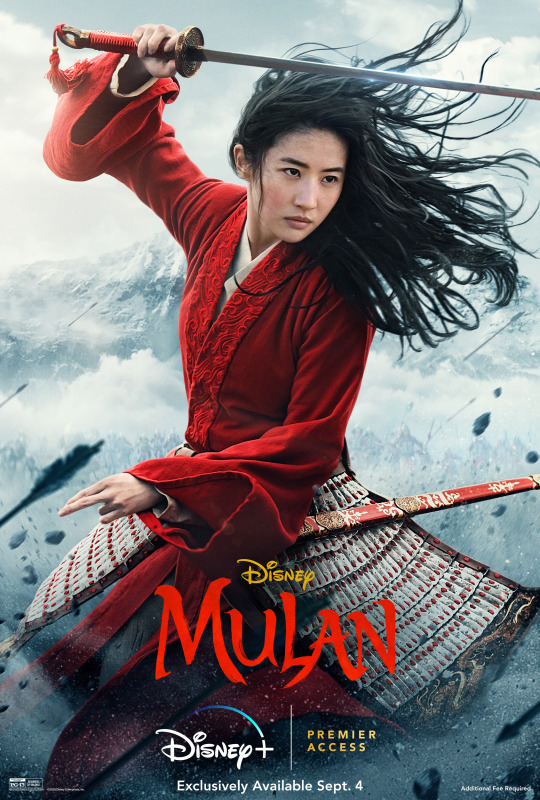
I am still waiting for that all Asian cast American movie that will be the "Black Panther" for the Asian community. So far the only proper all Asian cast American movie is Crazy Rich Asian and that was a rom-com about rich people which isn't what I am looking for. The Disney live-action remake of Mulan (1998) is a proper big-budget all Asian cast movie that aligns with what I am looking for. However, Disney live-action remakes have been mostly a miss apart from "The Jungle Book" and "Cinderella". Mulan (2020) is directed by Niki Caro who won lots of awards for her movie Whale Rider(2002) but it does make me wonder if they couldn't have just hired an Asian director but whatever. The trailers though seem to suggest that this remake was actually attempting to do things differently from the original which intrigued my interest. Unfortunately, due to coronavirus, this movie got delayed and then shoved to streaming with a hefty price instead of going to cinemas. I actually avoided watching the original Mulan recently just to make myself go into this movie with a more open mind and to have a sort of first time watching experience again. Therefore, I am going to avoid comparison with the original in this review. So after watching this, did the movie live up to the expectations?
Note: unlike my previous reviews there is going to be a fair amount of minor spoilers here so be warned.
Firstly, visually the movie is quite beautiful. There are some gorgeous shots in this movie such as the martial art practice by the lake, Mulan running on the rooftops and even the war itself was quite visually pleasing. The cinematography isn't "Roger Deakins" level of stunning but it is definitely really good looking. This is also elevated by the really good set design and costumes. The set design allows for great scenery and the costumes feel authentic. These really help pull the audience into the movie and the era that Mulan is set in.

Secondly, the score by Harry Gregson-Williams who has done the score for movies like Shrek and The Martian does a pretty good job here as well with Mulan. They use a lot of wind instruments that are heard from a lot of Chinese movies and pretty much use them here. The score generally works and it really helps create the atmosphere for each scene really well. Also, the orchestral cover of Reflection from the original Mulan is used in this movie and is just really awesome,
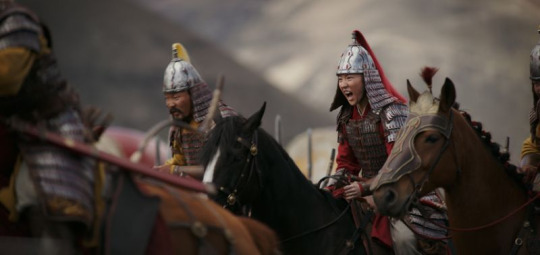
Now my gripes with this movie. Firstly, is the lack of emphasis on emotional moments. It feels like the movie brushes over a lot of what I would consider quite important. The scene where Mulan makes the decision to go to war is one of the important decision she makes. However, the movie just has her pick up a sword and then the next scene she is in armor and off to war. We don't get any emphasis on how important this decision was and the sacrifices she had to make until halfway through the movie for some reason. This happens a couple of times as well such as when there is a destroyed town which shows the horror of war but they only spend a couple of seconds here with minimal reaction from the characters and it's then just off to the next scene. Another being a character dying and it's just whatever. The movie feels really lacking in a lot of humanity but there are a couple of banter moments between Mulan and "friends" that have some fun in it.
On that note of characters, the supporting characters are rather bland. Honghui (Yoson An) acts as a love interest, rival and ally for Mulan which is all there is about him. Commander Tung (Donnie Yen) sort of mentors Mulan and knew Mulan's dad but that's really it. The Emperor (Jet-li) is a badass and wise emperor who barely appears in the movie. Bori Khan (Jason Scott Lee) who is the main villain also barely appears in the movie despite being the bad guy who started the war. The Witch (Gong Li) who is probably the worst character in this entire movie is like Mulan but bad. These are all the relevant supporting characters but there are others who are so forgettable I don't remember if they even had names.

The character arc which is part of the story is not great either. Mulan's decision to finally be true to herself and not hide that she is a woman just sort of happens because she got beaten up. Instead of it happening in a dramatic way it just feels rather random. Also, Mulan is special because she got lots of chi which ruins the message of the movie. Instead of feeling like she earned her place in the army and gaining the recognition of her comrades through her efforts it instead feels like she only got it because she is the chosen one. So the message is now "be true to yourself only if you're the special one". The Witch also goes through a character arc as well but it is extremely rushed and dumb. She makes choices that don't even make any sense such as divulging the main villain plans or sparing Mulan constantly or the really dumb choice at the end of the movie. Her addition to Mulan is pointless and if anything took away all the screentime from the main villain instead.
The action scenes are also mediocre which is such a shame. Asian movies have always nail action scenes with their amazing choreography but in Mulan it is BORING. The trailers made it seem like it might be in the veins of "Crouching Tiger, Hidden Dragon" withs it floaty yet elegant style of fighting. However, it instead really plain and overly edited with many cuts.
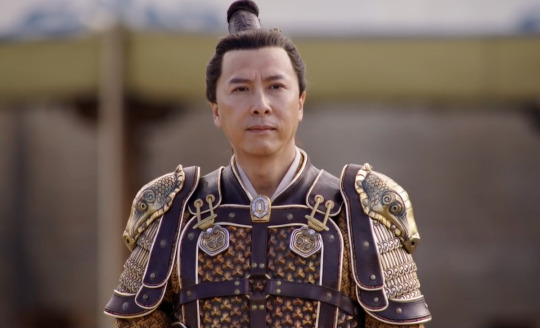
On that note of edits, there are some weird edits in this movie that make it feel like there were important scenes that were cut. Minor spoilers but there is a scene where Mulan is riding a horse towards the enemies army in an open field but then the next scene suddenly has her behind the enemy hiding behind a rock with no explanation whatsoever. There is also a scene where after Mulan has decided to be true to herself in which she saves an ally but makes a choice to disappear into the fog. The next scene is then showing her dramatically coming back to her allies seconds later. It is so weird and took me out of the movie for sure.

I also have to talk about our main lead actress Liu Yifei who plays Mulan. She sucks. She plays Mulan with no charm or charisma or even a personality. The tone in her voice is always the same and the only real change in her voice is when she is pretending to be a male with a deep voice. She also makes no expression whatsoever, it always feels like she has the same neutral expression in every moment even when someone died its the same expression. At least Donnie Yen and Jet Li are good in their roles though.
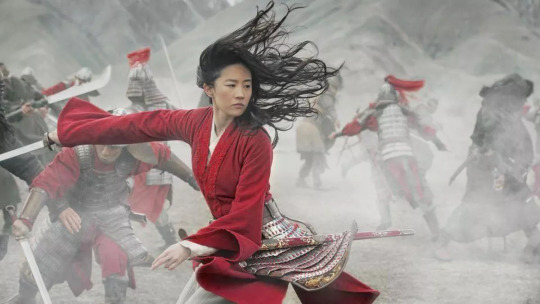
Overall, the movie is not the all Asian cast American movie I am waiting for. It is just another inferior remake from Disney. It has none of the fun that was in the original so the movie just ends up being boring. There are some things you can enjoy in the movie with some pretty good moments sprinkled in there. Additionally, it is still pretty much a retelling of the original Mulan so the overall story is still there. It just isn't as good it could have been. Such a shame...

542 notes
·
View notes
Text
Gnostic Boardwalk
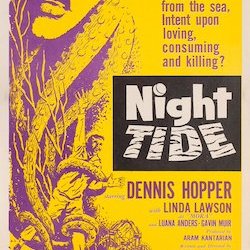
Canonical stature is a fragile and contingent thing, which is why powerful institutions seek to shore up the various canons of art with rankings and plaudits. We’ll play along by asserting that one of our favorite “B” movies was originally screened by Henri Langlois at the Cinematheque française with Georges Franju in attendance. Night Tide (1961) was an unlikely contender for this particular honor—shot guerrilla style on an estimated $35,000 budget, and intended, by its distributors at least, for a wider, less demanding audience seeking mostly air-conditioned escapism.
With its hinky cast—nonfictional witch, Marjorie Cameron; erstwhile muse to surrealist filmmaker Jean Cocteau, the undersung Babette who usually appears en travesti; and lecherous, booze-addled, fresh-faced Hollywood castoff Dennis Hopper—Night Tide invades the drive-in. A tarot reading at the film’s heart gives Marjorie Eaton her time to shine, traipsing into nickel-and-dime divination from her former life as a painter of Navajo religious ceremonies. Linda Lawson might have issued from an etching by Odilon Redon, with her raven locks and spiritual eyes, our resident sideshow mermaid. Not surprisingly and despite such gentle segues, the film itself traveled a rocky road from festivals to paying venues.
Night Tide had spent three years languishing in the can when distributor Roger Corman smuggled the unlikely masterwork into public consciousness, another of his now legendary mitzvahs to art. And the sleazy-sounding double bills that resulted also unleashed an aberrant wonder: the movie’s compact leading man, a force previously held captive by the studio system—looking, here, like some homunculus refugee from the Fifties USA. Dennis Hopper, in his first starring role, would later recall that it represented his first “aesthetic impact” on film since his earlier appearances in more mainstream productions such as Rebel Without a Cause and Giant had denied him meaningful outlets for collaboration.
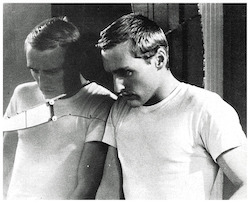
It’s the presence of its featured players—certainly not their star power—that lends the film its haunting and enduring legacy, and elevates the term “cult classic” to its rightful place in the pantheon of cinema. But we argue that Night Tide remains outside these exclusive parameters—upholding an elsewhere-ness that defies commercial, if not strictly canonical, logic. Curtis Harrington’s first feature film escapes taxonomy, typology or genre—gets away—fueling itself on acts of solidarity instead. If Hopper contributes his dreamy aura, then Corman rescues the seemingly doomed project by re-negotiating the terms of a defaulted loan to the film lab company that was preventing the film’s initial release. His generous risk birthed a movie monument that would add Harrington’s name to a growing collection of talent midwifed by the visionary schlockmeister responsible for nursing the auteurs of post-war American cinema. And here we enter a production history as gossamery as Night Tide itself.
Unlike his counterparts entrenched within the studio system, Harrington was an artist – i.e. a Hollywood anachronism, with aristocratic graces and a viewfinder trained on the unseen. We see Harrington as Georges Méliès reborn with a queer eye, casting precisely the same showman’s metaphysics that spawned cinema onto nature. By the time moving pictures were invented, artists were moving away from a bloodless representational ethos and excavating more primordial sources for inspiration. The early stirrings of what surrealist impresario André Breton would later proclaim: “Beauty will be CONVULSIVE or it will not be at all.”
Harrington owned a pair of Judy Garland’s emerald slippers, and according to horror queen/cult icon Barbara Steele, also amassed an eclectic array of human specimens: “Marlene Dietrich, Gore Vidal, Russian alchemists, holistic healers from Normandy, witches from Wales, mimes from Paris, directors from everywhere, writers from everywhere and beautiful men from everywhere.” On a hastily constructed Malibu boardwalk, Hopper would be in his milieu among the eccentric denizens of California’s artistic underground—most notably, Harrington himself, a feral Victorian mountebank of a director who slept among mummified bats, practiced Satanic rites, and hosted elaborate and squalid dinner parties. One could almost picture the mostly television director in his twilight years as Roman Castavet of Rosemary’s Baby; a spellbinding raconteur with a carny’s flair for embellishment and enticement. Enthralled by the dark gnosticism of Edgar Allan Poe that had started when the aspiring 16-year-old auteur mounted a nine-minute long production of The Fall of the House of Usher (1942), Harrington would embark on a checkered film career that combined his occult passions with the quotidian demands of securing steady employment. Night Tide, a humble matinee feature whose esoteric underpinnings would spawn subsequent generations of admirers, united the competing forces of art and commerce that Harrington would struggle with throughout his career. Like Méliès, Harrington pointed his kinetic device towards the more preternatural aspects of early motion pictures to seek out the ‘divine spark’ that Gnostics attribute to transcendence, and the necessary element to achieve that immortal leap into the unknown. What hidden meanings and unspeakable acts Poe had seized upon in his writing were brought infernally to life with a mechanical sleight-of-hand. It was finally time for crepuscular light, beamed through silver salts to illuminate otherworldly and other-thinking subjects.

Curtis Harrington
By the time Harrington had embarked on his feature film debut, a more muscular celluloid mythology based on America’s proven exceptionalism was in full force, taking on a brutalist monotone cast in keeping with the steely-eyed, square-jawed men at the helm of a nascent super-power, consigning its more feminine preoccupations to the dusty vaults where celluloid is devoured by its own nitrate. Harrington would resurrect the convulsive aspects of his chosen vocation and embed them deep within the monochrome canvas he’d been allotted for his first venture into feature filmmaking, and combine them with the more rational aspects of so-called realism. In the romantic re-telling of a familiar myth, Harrington was remaining true to gnostic roots and the distinctly poetic language used to express its cosmological features.
In Night Tide, Harrington would map the metaphysical terrain that held up Usher’s cursed edifice as a blueprint for his own work that similarly explored the intertwined duality of the natural and the supernatural. The visible cracks that reveal a fatal structural weakness and a loss of sanity in both Roderick Usher and his doomed estate are evident in Night Tide’s conflicted heroine compelled to choose between her own foretold death underwater, or a worse fate for those who fall in love with her earthly human form.
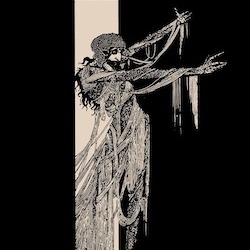
A young sailor (Dennis Hopper) strolling the boardwalks of Malibu while on shore leave offers the viewer an opening glimpse into the film’s metaphysical wormhole, and a not so subtle hint of the director’s queer eye, stalking his virginal prey in the viewfinder. A beachfront entertainment venue is, after all, where one would casually encounter soothsayers and murderers, sea witches and perverts, as the guileless Johnny does, seemingly oblivious to the surrealist elements of his surroundings as he makes his way on land.
Harrington’s carnival-themed underworld is both imaginatively and convincingly presented as a quaint slice of post-war America, effortlessly dovetailing with his intended drive-in audience’s expectations of grind house with a dash of glamor—not to mention his own avant-garde leanings, which remain firmly intact despite Night Tide’s outwardly conventional construction and narrative.
Harrington is able to present this juxtaposition of kitsch Americana and the queer arcana of his occult fascinations. Indeed, Night Tide’s lamb-to-the-slaughter protagonist could have wandered off the set of Fireworks, Kenneth Anger’s 1947 homoerotic short film about a 17-year-old’s sadomasochistic fantasies involving gang rape by leathernecks.
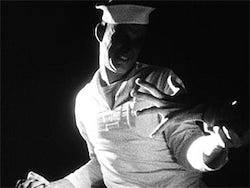
Anger would later sum up his earliest existing film as “A dissatisfied dreamer awakes, goes out in the night seeking a ‘light’ and is drawn through the needle’s eye. A dream of a dream, he returns to bed less empty than before.” Harrington (a frequent collaborator of Anger in his youth) seems to have re-worked Fireworks, or at least its underlying queer aesthetic into a commercially viable feature film that explores his own life long occult fascinations.
Both Anger and his former protégé would view the invocation of evil as a necessary step towards the attainment of a higher level of consciousness. Harrington coaxed a more familiar story from the myths and archetypes that informed his unworldly views for a wider audience; a move that would be later interpreted by sundry cohorts as selling out. Still, Night Tide shares a thematic kinship with Anger’s more obtusely artistic output as acknowledged by the surviving occultist, who confirmed this unholy covenant at Harrington’s funeral by kissing his dead friend on the lips as he laid in his open coffin.
The hokey innocence of Dennis Hopper as Johnny Drake in his tight, white sailor suit casts a homoerotic hue on the impulses that compel him to navigate a treacherous dreamscape to satisfy a carnal longing, just as Anger’s dissatisfied dreamer obeys the implicit commands of an unspeakable other to seek out forbidden pleasures.
As he makes his way on land, the solitary, adventure-seeking Johnny will be lured into a waiting photo booth, his features slightly menacing behind its flimsy curtain, and brightly smiling a second later as the flash illuminates them. Johnny has entered a realm where intersecting worlds collide, delineating light from shadow, consciousness from unconsciousness. The young sailor’s maiden voyage into the uncharted waters of his subconscious is made evident in the contrasting interplay captured by the camera, where predator and prey overlap in darkness. Here, too, we get a prescient preview of the deranged psychopath Hopper would subsequently personify in later roles, most significantly as the oxygen deprived Frank of Blue Velvet—a man who seems to be drowning out of water. But here, Hopper convincingly (and touchingly) portrays a wide-eyed naïf, still unsteady on his sea legs as he negotiates dry land.
As a variation of Anger’s lucid dreamer in Fireworks (and later Jeffrey of Blue Velvet) Johnny will have abandoned himself quite literally (as his departing shadow on a carnival pavilion suggests, before its host blithely follows) to his own suppressed sexual urges; a force that eventually compels him towards denouement.
Moments later, inside the Blue Grotto where a flute-led jazz combo is in progress, Johnny spots a beautiful young woman (Linda Lawson) seated directly across from him. Her restrained and almost involuntary physical response to the music mimic his own, offering the first indication of a gender ‘other’ residing in Johnny; an entombed apparition cleaved from the sub-conscious and projected into his line of vision. Roderick and Madeline Usher loom large in Harrington’s screenplay and Usher’s trans themes lurk invisibly in the subtext. Harrington is arguably heir apparent to Poe’s vacated throne, pursuing similar clue-laden paths and exploring the dual nature of human and the primordial creature just beneath the surface poised to devour its host.
The near literal strains of seductive Pan pipes buoyed by the ‘voodoo’ percussion sets the stage for Harrington’s reworking of the ancient legend of sea-based seductresses and the sailors they lure to their graves.

Marjorie Cameron (or ‘Cameron’ as she is referred to in the opening credits) makes a startling entrance into The Blue Grotto as an elder of a lost tribe of mermaids seeking the return of an errant ‘mermaid’ to her rightful place in the sea. Cameron, a controversial fixture in L.A.’s bohemian circles and one-time Scarlet Women in the mold of Aleister Crowley’s profane muses, would later appear in Anger’s The Inauguration of the Pleasure Dome, and as the subject of Harrington’s short documentary The Wormwood Star (1956).
The inclusion of a bonafide witch, along with a host of less apparent occult/avant-garde figures, is further evidence of Night Tide’s true aspirations and its filmmaker’s subversive intent to sneak an art-house film into the drive-in, and introduce its audiences to the heretical doctrine that had spawned a new generation of occult visionaries influenced by Edgar Allan Poe. Decades later, David Lynch would carry that proverbial torch, further illuminating the writhing, creature-infested realm underlying innocence.
Johnny approaches the young woman who rebuffs his attempts at conversation, seemingly entranced by the music, but allows him to sit, anyway. Soon they are startled by the presence of a striking middle-aged woman (‘Cameron’) who speaks to Johnny’s companion Mora in a strange tongue. Mora insists that she has never met the woman before, nor understands her, but makes a fearful dash from the club as Johnny follows her, eventually gaining her trust and an invitation the following day for breakfast.
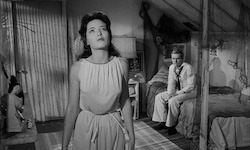
Mora lives in a garret atop the carousal pavilion at the boardwalk carnival where she works in one of the side show attractions as a “mermaid.” Arriving early for their arranged breakfast, her eager suitor strikes up a conversation with the man who runs the Merry-Go-Round with his granddaughter, Ellen (Luanna Anders). Their trepidation at the prospecting Johnny becoming intimately acquainted with their beautiful tenant is apparent to all except Johnny himself, who is even more oblivious to Ellen’s wholesome and less striking charms. Even her name evokes the flat earth, soul-crushing sensibilities of home and hearth. Ellen Sands is earthbound Virgo eclipsed by an ascendent Pisces. (Anders would have to subordinate her own sex appeal to play this mostly thankless “good girl” role. She would be unrecognizable a few years later as a more brazenly erotic presence in Easy Rider, helping to define the Vietnam war counterculture era.)
As Johnny ascends the narrow staircase leading to Mora’s sunlit, nautical-themed apartment, he almost collides with a punter making a visibly embarrassed retreat from the upper floor of the carousel pavilion. Is Johnny unknowingly entering into a realm of vice and could Mora herself be a source of corruption? Her virtue is further called into question when she not so subtly asks Johnny if he has ever eaten sea urchin, comparing it to “pomegranate” lest her guest fails to register the innuendo that is as glaring as the raw kipper on his breakfast plate. Johnny admits that he has never eaten the slippery delicacy but “would like to try.” Moments later, Mora’s hand in close-up is stroking the quivering neck of a seagull she has lured over with a freshly caught fish, sealing their carnal bond.
Their subsequent courtship will be marred by an ongoing police investigation into the mysterious deaths of Mora’s former boyfriends, and her insistence that she is being pursued by a sea witch, seeking the errant mermaid’s return to her own dying tribe. Her mysterious stalker will make another unwelcome entrance after her first appearance in the Blue Grotto—this time at an outdoor shindig where the free-spirited young woman reluctantly obliges the gathered locals who urge her to dance. The sight of ‘Cameron’ observing her in the distance causes the frenzied, seemingly spellbound dancer to collapse, setting off a chain of events that will force Johnny to further question her motives and his own sanity.
Mora’s near death encounter through dance is an homage of sorts to another early Harrington collaborator and occult practitioner. Experimental filmmaker Maya Deren had authored several essays on the ecstatic religious elements of dance and possession, and later went on to document her experiences in Haiti taking part in ‘Voudon’ rituals that would be the basis of a book and a posthumously released documentary both titled Divine Horsemen: The Living Gods of Haiti. Note the Caribbean drummers whose ‘unnatural’ presence, in stark contrast to the more typical Malibu beach party celebrants, hint at the influence of black magic impelling the convulsive, near heart-stopping movements that eventually overtake her ‘exotic’ interpretive dance.

The opening sequence of Divine Horsemen includes a woodblock mermaid figure superimposed over a ‘Voudon’ dancer. The significance of this particular motif was likely known to Harrington, a devotee of this early pioneer of experimental American cinema. Deren herself appeared as a mermaid-like figure washed ashore in At Land (1947) who pursues a series of fragmented ‘selves’ across a wild, desolate coastline. Lawson with her untamed black hair and bare feet could be a body double of Deren’s elemental entity traversing unfamiliar physical terrain to find a way back to herself.
Mora’s insistence that she is being shadowed by a malevolent force directly connected to her mysterious birth on a Greek Island and curious upbringing as a sideshow attraction compel Johnny to investigate her paranoid claims, hoping to allay her fears with a logical explanation for them. The sea witch (or now figment of his imagination) will guide the sleuthing sailor into a desolate, mostly Mexican neighborhood where her departing figure will strand him—right at the doorstep of the jovial former sea captain who employs Mora in his tent show as a captive, “living, breathing mermaid.”
The British officer turned carnie barker is in a snoring stupor when Johnny first encounters him, snapping unconsciously into action to give a rote spiel on the wonders that await inside his tent. Muir balances Mudock’s feigned buffoonery with a slightly sinister edge. When Johnny arrives at his doorstep to find out more about the ongoing police investigation into her previous boyfriend’s deaths, the captain’s effusive hospitality takes on a decidedly darker tone when he guides his visitor to his liquor/curio cabinet where a severed hand in formaldehyde, “a little Arabian souvenir,” is cunningly placed where Johnny’s will see it. The spooky appendage serves as a reminder to Mora’s latest suitor of the punishments in store for a thief.
Captain Murdock’s Venice beach hacienda is yet another one of Night Tide’s deviant jolts: a fully fleshed out character in itself that speaks of its well-travelled tenant’s exotic and forbidden appetites. The dark, symbol-inscribed temple Johnny has entered at 777 Baabek Lane could be a brick-and-mortar portal into this mythic, mermaid-populated dimension that Johnny’s booze-soaked host thunderously defends as real.
Before falling into another involuntary slumber, Murdock will try to convince Johnny that while he and Mora merely stage a sideshow illusion, “Things happen in this world”—or, more to the point, Mora’s belief that she is a sea creature is grounded in fact.
Murdock’s business card that Johnny handily has in his pocket while tailing his dramatically kohl-eyed mark is oddly inscribed with an address more likely to be an ancient Phoenician temple of human sacrifice (Baalbek) than a Venice Beach bungalow. A lingering camera close-up offers another tantalizing, occult-themed puzzle piece—or perhaps a deliberate Kabbalah inspired MacGuffin. The significance of numbers as the underlying components for uniting the nebulous and intangible contents of the mind with the more inert, gravity bound matter, existing outside it, as the ancient Hebrews believed, wouldn’t have been lost on Night Tide’s mystically-minded helmer. Mora’s explicitly expressed disdain for Johnny’s view of the world as a rationally ordered, measurable entity that could be mathematically explained, reinforces Harrington’s world view, his love of Poe, and those French Symbolist artists who interpreted him.
In Odilon Redon’s Germination (1879), a wan, baleful, free-floating arabesque of heads of indeterminate gender suggests either a linear, ascending involution, or a terrifying descent from an unlit celestial void into a bottomless pit of an all-too-human, devolving identity. Redon’s disembodied heads gradually take on more human characteristics, culminating into a black-haloed portrait in profile. The cosmos of Redon’s etching is governed by an unexplained, inexplicable moral sentience, which absorbs the power of conventional light. Thus black is responsible for building its essential form, while glimmers of white, hovering above and below, prove ever elusive; registering as somehow elsewhere, beyond the otherwise tenebrous unity of the picture plane.
Night Tide has its own unsettling dimensions, of course, this black-and-white boardwalk where astral, egalitarian bums want to tip-toe; and, somehow, practically all of them do. Not a movie but an ever-becoming place, crammed into low-budget cosmogenesis unto eternity. We won’t discuss the ending here, since it hasn’t happened yet.
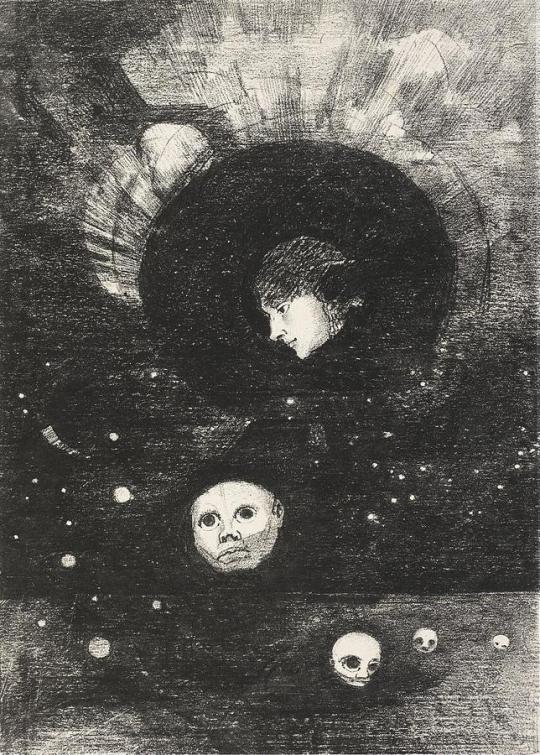
by The Lumière Sisters
18 notes
·
View notes
Text
Miraculous is playing one big game of Calvinball with its magic/power system and it undermines the show quite a bit
TL;DR: Miraculous has, at first glance, a very basic power/magic system… Only whenever it tries to get more complicated than “Moon Prism Power, Make up!” it ends up being an unspeakable mess, due to poor creative decisions that don’t allow for the audience to truly understand what is going on and why, outside of “whatever the plot requires so that we can get to the next scene”.
It may well be because the people making this show wanted to shift their attention to kwamis and their powers in the future seasons, but holding onto that for seventy-something episodes has done the show a disservice.
Longg isn’t the kwami of Perfection. Longg is the kwami of being a cool dragon. And sometimes, being a cool dragon is enough, you know? Instead of doing complex things poorly, you can tackle simple concepts really well and people won’t think any less of your creation, au contraire.
Throughout the history of the superhero genre, a pretty nifty thing most creators have understood is that you need to explain a bit of how and why the hero’s powers work. Superman is superpowered because it’s all a matter of gravity, a fact underlined in the very first issue of Action Comics, in the very first page of Superman ever. The X-Men are mutants. Sherlock Holmes was bitten by a radioactive detective.
Basically, what happens in most cases is, the creators come up with a set of rules to sort of explain the storyworld so that you know to manage your expectations, so that the storyworld feels more cohesive too. That’s what I call a neat way to allow your audience to suspend their disbelief and feel more involved in the story being told! Things happen and are allowed to happen a certain way for a reason in-universe, there is a kind of logic proper to the work of fiction being built that makes it easier for the audience to fully get into said work.
In Hunter X Hunter, Nen is a pretty cool concept that is well-defined, we see what it is at first with no explanations, and it’s hella intriguing, which makes you want to know more (and that’s deliberate) and then the manga explains it to you a few chapters later and for the most part, Togashi sticks to that definition. And now we understand what is going on and how. Cool, right?
What do we have here? Creative decisions that are often given justifications in-universe to make them more believable in the context of the story being told, even though they are ultimately arbitrary decisions which can be challenged (see how Superman’s powers changed over time, for instance). You can toy with these explanations and that makes for great comedic potential, just look at One Punch Man!
Magic can be a little murkier for sure, because magic doesn’t necessarily follow rational logic. I won’t be getting into the soft/hard magic talk here. Still, if you want your audience to understand what is going on and if you’re not a complete hack (looking at you Joanne Kathleen), you tend to set up some rules so that the audience can grasp what the hell is going on, understand why something is really impressive or really basic. Is it really such a big deal that a character is able to master that one spell? Why? Ursula Le Guin and Brandon Sanderson are really good at that, and manage a good balance of mystery and understandability.
Miraculous fumbles the bag pretty hard when it comes to how its magic/power system works. Which, after 70-something episodes, is not great.
Part of it is due to the exposition style Miraculous has chosen for itself, which could be great but ultimately isn’t, and part of it is due to poor definition in the first place.
Miraculous hates exposition dumps most of the time, and I think it’s actually a good thing. No one wants to feel as though they’re sitting through a boring class instead of having fun. Well done, guys! Exposition dumps often make you all the more aware of the artificiality of a story. And so, Miraculous mostly relies on context cues as a means of introducing you to the world. They just show you the thing and trust you to understand and interpret it properly. And sometimes, it works really well!
I still sincerely believe that Stormy Weather is a fantastic first episode, and it does its job amazingly well. In 24 minutes, you learn the very basic outlines of how stuff works, relationships between the characters and superpowers. Yes, it’s very basic, but that’s fine, you can’t drop all that new information on your audience all at once. We understand that the power within the Miraculous, that of the kwami, allows for its wearer to transform. This comes with nifty perks, heightened agility, reflexes, amazing strength, magical accessories, and special quirks unique to each of the Miraculouses.
Are we good so far? See, if we stuck to that, it’d be fine. Not mind-blowing but pretty okay still. Doesn’t have to be too complicated to be enjoyable, just look at Sailor Moon!
And then Miraculous tried to spice things up and communicated its ideas so poorly that the arbitrary decisions taken by the writers are glaring, and seriously affect the audience’s suspension of disbelief and enjoyment.
The kwamis aren’t just cutesy mascots, they’re gods. And yet their powers are very limited. Why? Well, the show doesn’t really bring that question up, we can only try and infer things. Now, what are these limitations, and why do they exist in the first place? I’ve got a vague answer to the first question (a time limit for transformation once the special power is being used).
The answer to that second question is very unsatisfactory, and that’s the only one I’ve got: “because the plot requires it if we want to do such and such thing”. Which is an answer that applies to absolutely all creative decisions in fiction, yes, but there’s usually more to it as well, in competently-made shows at least, it’s not so transparent. Why is Marinette able to wield so many Miraculouses at once? Well, it’d look cool and it’d make her look powerful, so why not! But Adrien can’t. Why? He just can’t. No explanations whatsoever. Just because. It’s magic. Shut up and watch the show.
Well, that’s not entirely true. We’ve got fleeting remarks about being able to unlock kwami powers and maintaining a transformation for longer and whatnot. The problem is, they’re just that, fleeting remarks, and worse, they are so scattered across the show it’s really easy to forget about them in-between episodes, especially since the release schedule is absolute nonsense (it isn’t the creators’ fault, but it certainly has an impact on the way the audience engages with the show). So no, the show isn’t going down the “just roll with it” route, not entirely… And that makes the lack of proper explanation that much worse.
It feels as through the few rules there are in Miraculous are being made up on the fly and… Heh. That’s just not great.
It doesn’t help that the powers themselves are… Really something, huh?
Chat Noir’s power is the only one that really fits with what his kwami is meant to represent. Destruction. Easy to represent, right?
Creation is trickier, that requires being imaginative, and Miraculous isn’t terribly imaginative when it comes to its lucky charms. Hey kids, did you know that you could use a ladder to stop an ice-skater? How creative! I mean you could also use salt to melt the ice, or a baseball bat to smash his kneecaps, then… The point is, being convoluted isn’t the same thing as being creative, and while Chat Noir gets to decide what he destroys, Ladybug gets an item thrown at her and you better believe she’ll find an use to it… How is that creation exactly? Is the lucky charm popping out of thin air creation? That’s a bit underwhelming, isn’t it?
Tikki represents convolution, Nooroo is the power of creating minor antagonists…
I had to check the Wiki to remember what concepts the other kwamis are meant to represent. There’s a disconnect between that and the way powers are represented on-screen. Pollen isn’t the kwami of Subjection. Pollen is the kwami of stabbing people with a stinger. How do I know that? I watched the show and nothing else.
If you want your audience to not be confused, if you don’t want your story to feel completely arbitrary to your audience (though it’ll always be just that), maybe take the time to explain things that are crucial for the understanding of the storyworld’s inner workings. You don’t have to give everything away in the first ten episodes, not at all, but you should explain them at some point, take the time to do so if these are more complex concepts that are crucial to your show. And if they aren’t key to your show, you don’t have to include them, and I promise no-one will notice.
40 notes
·
View notes
Note
Hi! Do you have any advice about how to reveal things about a character's past - particularly Big things, like trauma or otherwise defining moments - without either a) hitting the audience over the head in a big exposition dump, or b) hiding key info to the point where it's a Mystery to an annoying degree? I love stories where a character's behavior is somewhat of an enigma until you learn something important about them, but I don't know how to actually do that myself, esp for the pov character.
oh man what a great question! i think about this all the time. so much of writing boils down to when to reveal information. revealing information early in the story offers context, character development, and raises the stakes. late in the story, it illuminates all that came before it and casts the story in a new light.
there is so much writing advice out there that’s like “cut the backstory! nobody cares about backstory!”
but let me tell you, i’m always a slut for a good backstory. anti-backstory people are the same ones who hated the movie Solo because “we didn’t need to know more about han, he was already a good character on his own!” i read so many bad takes to that effect, and i kept thinking, excuse you! *i* want to know more about han solo!! i want information that will change and deepen my perspective of a trilogy i’ve seen a thousand times so i might go back and watch it again with new eyes!!
anyway. i’ve also been reading danmei, specifically mxtx, who is truly a galaxy brained writer when it comes to backstory. she completely changed my perspective on what it looks like to weave together a vast and complicated story structure. i remember watching the Untamed, deeply irritated by the 30-episode backstory, thinking about what poor writing it was and how if i could get my hands on the script, i’d pare it down and weave it in more thoroughly.
but then! by the end of the flashback, i was sobbing!! me! crying! over media! and i thought, i’ve had this reaction to a story maybe only a handful of times in my entire life? maybe instead of judging this for not meeting my (extremely western and strict) standards of a “good story” i should be listening to what it’s teaching me?
i honestly think i’ve learned more about writing from mxtx than my entire first semester of a cw phd.
now onto the actual advice:
in the first draft, let the backstory unveil itself to you naturally without concerning yourself with where information should go.
if you’re not used to writing multiple drafts, this might be difficult. but if you have a complicated past timeline that affects the present timeline, it’s nearly impossible to do it all in one go. you need at least one draft to get it all down, and another draft to put it in the right order. most of the revision process, i’ve found, is putting things in their right place. the creative brain is not an orderly thing, even for those of us who plan meticulously.
while you’re drafting, you’ll find natural pockets where contextual information should go. follow the paths that open for you. if you get to a point where a character is thinking about a certain moment in their past, go into what happened right then and there. you can always move it later, or expand on it, or cut it. but it’s important to see those cues and respond to them the very second you’re inspired to do so.
note, this is the same for nonfiction! if you’re writing a memoir or personal essay, memories will trigger other memories, and the more you allow yourself to follow those paths, the easier it is to see the patterns that emerge. you have to let your stories tell themselves to you.
okay so let’s say you’ve done all that. the past events are all there, but it’s awkwardly placed/you just don’t like where it is. how do you find where it goes?
unfortunately i can’t tell you where backstory/contextual information should always go or how it should be placed there. but i can tell you what certain positioning does to a narrative, so you can make a more confident decision.
i can go on at length about the movement of time in a story, but i want to keep this narrowed down to the basic premise that you have a present timeline that is informed by past events, and the present timeline is the main story. (there are many other ways to navigate time, but i’m defaulting to this setup because it’s what anon is asking, and also probably the most common.)
in your present timeline, you have plot points, moments where A Thing Happens. i’ll call these moments “events.” likely, you’ve established the stakes of these events as well as their consequences. if your past timeline (stuff that occurs before your story begins) informs these events, your first choice is whether or not you want to put them before an event or after it.
if you put the backstory prior to the event, you contextualize and add depth as or before the event unfolds. this option is good for romances, adventure stories, any narrative where the tension derives from a gradual increase in stakes, and the conflict is built by an opposing force like an antagonist.
if you put the backstory after, you illuminate the event and cast it in a new light. this might be a twist or reveal, which is good for mysteries, thrillers, or stories where the tension comes from the unveiling of information in order to answer a question the story poses.
and you can also have a bit of both! maybe you want to tease out some information and reveal some later, or have the past and present run parallel. maybe you want to begin the backstory, cut it short, the event happens, and then you complete the backstory. this method might be good for stories where the present timeline has lower stakes than the past timeline, like recovery narratives.
once you’ve decided before/after/during, the next major decision is whether you want to thread the past into the present via summary (indirect discourse), or if you want discrete, in-scene flashbacks (direct discourse). obviously you can also do a bit of both!
i think this decision will likely depend on your narrator. sometimes a well-written 3-sentence summary is more evocative than a 3-page detailed flashback, especially if the past timeline is a composite memory. that is to say, it’s not a single event that happens, but a series of them, like if you have a memory of always eating a bologna sandwich after school, your brain compiles that into a single memory even though you know you did it a thousand times.
but sometimes, if a past moment is really important, the 3-page detailed flashback is necessary. sometimes you’ll begin with summary and move into a scene and back out. when it comes to backstories, don’t be afraid to play around with discourse. how does the style and tone change when you summarize a conversation versus when you write it in actual dialogue? personally i’ve found that less is more when it comes to backstories so I err toward summary, at least in my own writing, but as a reader i appreciate each kind of approach.
lastly and most importantly, get a beta reader and ask them specifically about their experience reading the backstory. here you want descriptive feedback. you’re not asking “what should i do? how do i fix this?” you’re asking, “how did you feel while reading it?” and that will tell you how to approach revision. sometimes i write a backstory that i think is a slam dunk, because i’m already invested in the characters, but i get reader feedback saying it’s boring/they were inclined to skip over it. sometimes i’m like, “haha good, be miserable and bored, you’ll thank me later.” and sometimes i’m like, “dammit fine” and kill my darlings.
on that note, sometimes you just have to own it, and bore/confuse your reader because you know the eventual payoff is good enough. if the info dump is the best/easiest/clearest method, do it. if teasing a backstory out slowly is what you’re going for, don’t be afraid to make the reader want to throttle you. you don’t write to buy into your reader’s expectations; nor do you write specifically to defy those expectations. you write to honor the story you want to tell, and you place contextual information that is most complementary to the narration you’ve chosen.
45 notes
·
View notes
Text
Stark On Ice: Starker Figure Skating AU Chapter 1
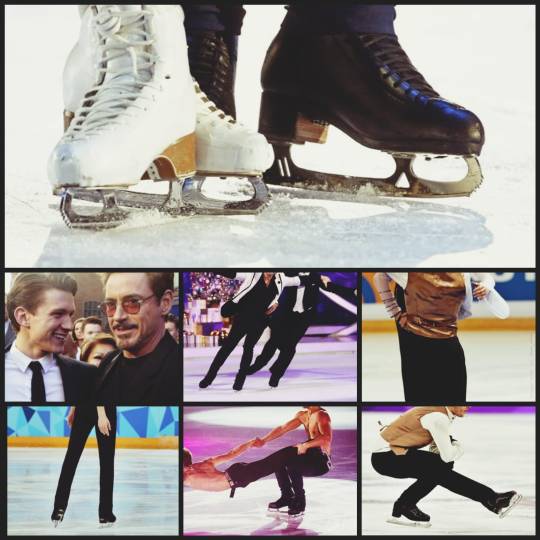
Summary:
Six months ago, the broadcasters asked Tony to participate in Celebrity Spin-Off; an annual TV series where celebrities get paired up with a professional figure skater and compete against each other. Well, he’d laughed in their faces, wondering why they’d even ask. Were they really that stupid? He had better things to do.
“If you can find me a male skater who lets me lead, I’m in,” he’d scoffed sarcastically to brush them off.
He didn't expect them to take his answer seriously.
Masterpost (to be posted)
Find On AO3
---
Chapter One: Let Me Entertain You
Tony readjusts his jacket as he walks into the large building that is the Midtown Ice Arena. It’s a few minutes before 7 AM, and he already downed a triple espresso on his way here - amusedly ignoring Happy’s complaints about it being so damn early. He will give the man a raise soon. Tony can’t say he’s a morning person, but having to get up this early every single day for three months in a row helps to get used to it. Today is different, though. He feels jittery and on-edge just thinking about today’s events. It’s the final rehearsal. Tonight he’s going to skate in front of the entirety of the States. He knows many people won’t even bother to watch the TV series, but the idea has him slightly nauseous anyway. His first live show…
Live show.
Tony chuckles sarcastically at himself as he sits down on one of the benches in the changing room. Live show. Six months ago, the broadcasters asked him to participate in Celebrity Spin-Off; an annual TV series where celebrities get paired up with a professional figure skater and compete against each other. Well, he’d laughed in their faces, wondering why they’d even ask. Were they really that stupid? He had better things to do.
“If you can find me a male skater who lets me lead, I’m in,” he’d scoffed sarcastically to brush them off.
He’s still not sure why they took his answer seriously, but they had. Tony Stark doesn’t back out of a promise, though. So, here he is, lacing up his skates after three months of intensive training, ready to work through his choreo together with his assigned partner Peter Parker. From what Tony’s heard, Peter is a pretty big deal in the skating world. He’s a sweet, enthusiastic 21-year-old who has enough talent and skill in pair skating to participate in the Olympics, yet he’d chosen not to. Instead, he tours across the US with Stars On Ice, coaches young kids at Midtown, and has a YouTube channel where he and his partner MJ post routines with traditional gender roles reversed.
Tony admires Peter’s passion. The man doesn’t like other people very fast, but Peter was something else entirely. He’s endearing in a way. It’s easy to like him. Which, thank god, is a positive thing. They’ve had to train together for a minimum of eighteen hours for the past three months - both on ice and off. Tony had been surprised to see that the theory classes and off-rink practice were just as important.
When Tony finishes lacing up his skates he walks towards the rink, finally knowing how to do that without looking like a waddling duck. A smile creeps onto his face when he spots his partner on the ice already. The boy moves around ever so graciously, practicing his triple axel. A few days prior, Peter told him he hadn’t done it in a while, and he and MJ intend to use it in their new YouTube tutorial, so he’s been wanting to perfect his landing. It’s not like he pops it, but the boy isn’t content very easily. Tony enjoys watching him rehearse no matter how he lands. He’s so beautiful out there. Like he was born to skate.
After landing perfectly three times, Peter slows down to give himself a short break, and that’s when he spots Tony at the entrance. The man waves awkwardly and Peter grins.
“Mornin’, grumpy-head!” Peter laughs as he skates towards him.
“Well, look at you. Always a beaming ray of sunshine, aren’t ya?”
“You know me too well, Mr. Stark. Hope you didn’t forget to apply your sunscreen today!” Peter jokes, jumping off the ice to give Tony a short hug. Tony hates to admit he likes that Peter greets him like that every single day. The boy isn’t scared of him, unlike most other people. Another reason why Tony likes him. He grunts as a response to the joke and nudges Peter.
“Think it’s time to start training. Steve here yet?” Tony asks, looking around to see if he spots their coach. Peter shakes his head.
“No, his car broke down a few blocks from Midtown, he’ll be here soon enough. Let’s start warming up so we can dive right into the sequence when he gets here.”
“Yes, coach.”
-
“Why- Why do these outfits have to be so glittery,” Tony jests as he eyes himself in the mirror. He’s wearing a tight and stretchy black button-up with thick, gold seams and shiny gold beads all over it. Thank god his pants are a simple plain black. Peter is adjusting his hair right next to him. The metallic gold tee hugs the boy’s skin so incredibly tight that Tony can’t help his gaze from wandering down a little, peeking at the boy’s gorgeous abs. Peter grins as he follows Tony’s gaze.
“Well, I guess that’s why,” Peter retorts, and Tony blushes. He sniffs, staring at his own reflection again.
“I have no idea what you’re talking about.”
“Says the man who asked for a male partner. I still don’t-”
“Oh shush,” Tony cuts him off playfully and waves his hand in the air. Peter simply chuckles and finishes styling his curls. They’re silent for a moment and Tony’s thoughts wander. He hadn’t meant to stare like that. Yes, he was bisexual but that doesn’t mean he liked Peter like that. They were already making headlines on entertainment websites. He can’t even imagine what’d happen if they’d actually feel something for each other. That’d be insane and highly unprofessional. The kid is too young, and- No. Tony doesn’t even have to make excuses for himself. Peter is nice. That’s it.
Thinking about them making the news doesn’t exactly settle his nerves. People are interested in them. Tony Stark on skates must be high-end entertainment for many people in itself, but the fact that they’re a male couple… He knows the public’s eye is on them tonight.
“So tell me, kid. How does one contain nerves for a show, uh?” Tony asks, trying to keep it casual but failing massively. A gentle smile tugs on Peter’s lips.
“Experience. Trusting yourself,” he starts. “You know, Tony. You won’t be flawless tonight. But that’s okay, remember? No one will be. Flawless is not what we aim for. Chemistry. Engaging the public, and-”
“-just having fun on the ice,” Tony finishes for him with a nod. Peter has told him this many times before, but the reminder does settle his nerves. Tony’s a beginner, but he’s got the name and his charm. And Peter... They’ve got a pretty good shot.
“Exactly. Now, tell me- what are you most nervous about?”
“Honestly?”
“Well, yes.”
“Dropping you.”
Peter sighs and takes a step closer to Tony.
“You won’t. You’ve only dropped me once, and I wasn’t even hurt. Even if it were to happen, I know how to take a fall. We’ll be alright. You’re one of the best skaters in this competition. You’re gonna ace this.”
“Thank you, Pete. Hey, for what it counts, I’m glad you’re my skating partner.”
“And I’m glad you’re mine.”
-
Tony’s throat is dry, his heart beating rapidly in his chest when his fingers tangle into Peter’s. The boy is so close to him, just like during practice. It grounds him. The floor manager smiles at them.
“Good luck out there, you ready for it?” Tony nods, his lips pressed together in a thin line. Smile. He should smile. Peter squeezes his hands once and Tony takes a deep breath. He’s got this. They’ve got this. The floor manager signals, “-Standing by…”
Oh, God. This is it. Tony sniffs. His hands feel sweaty, his stomach knots together once more. As much as he appears to be comfortable in public, the moment right before always has him on edge. Any moment now. His gaze focused on the floor manager. Waiting for her cue.
“And go!”
Tony forces his most charming smile on his face when he skates forward in unison with Peter, the cheers of the audience enveloping him. They stop in the center of the rink and he guides Peter in front of him. The boy’s arms are crossed in front of his chest. Tony puts a hand on Peter’s right shoulder. It’s quiet for a second, but then the familiar tune starts playing and Tony licks his lips. Peter smirks, pushing his skates into the ice to circle around the man, Tony’s gaze tracking him until he’s in front once again.
Hell is gone and heaven’s here
There’s nothing left for you to fear
Shake your arse come over here
Now scream
Peter twirls and presses into Tony’s side. They grin at each other and skate forward, towards the edge of the rink. Tony’s nerves finally settle when he focuses on just how smooth Peter glides over the ice. The loud music cuts off the sounds of their blades crushing the frozen surface beneath them, but Tony hears it in his mind instead. He knows exactly where to turn, where to move. Peter sends him a little nod right before they go into the crossovers. Tony doesn’t like crossovers all that much, it makes him feel stiff and uncoordinated. Yet, somehow his body seems to do it on autopilot today, simply mimicking Peter’s lead.
I’m a burning effigy
Of everything I used to be
You’re my rock of empathy, my dear
Tony feels powerful in a way, his movements loosening up with every passing second. It’s time for their waltz jump. He turns around to transition into backward crosscuts and then shifts his weight from the right outer edge to the left one, throwing his right leg up in front. He gasps when he feels how smoothly he lifts off the ice. He’s flying through the air, weightless, and a quick glance confirms that Peter is too. When his right foot hits the ice again, he bends his right knee and extends his left leg behind him. The applause envelopes him like a warm blanket and the adrenaline coursing through his veins is an exhilarating sensation. He did it. He did it!
So come on let me entertain you
Let me entertain you
Let me entertain you
Tony turns around again to find Peter skating in his direction with a proud and goofy grin on his face. Tony’s heart leaps out of his chest when he realizes his partner is just as impressed as he is. Their hands find each other as they increase their speed to make it through another set of crossovers. Tony doesn’t even worry about them anymore at this point. Everything is just fucking amazing.
Let me entertain you
Let me entertain you (let me entertain you)
So come on let me entertain you (let me entertain you)
Let me entertain you (let me entertain you)
Tony takes a deep breath when he realizes it’s time for their lift. He sets off for his continuous three turns and feels how Peter starts leaning into him. The man prepares for the boy to jump up from the ice gracefully. When Peter does so, he easily catches him and they spin into their rotational lift. Tony loves this one - loves to have Peter in his arms bridal style while spinning around and around and around while remembering his words. Don’t be afraid of the speed. Stalling is falling. Tony doesn’t feel like they’re falling. No, it feels like they’re floating, setting off for space.
Come on come on come on come on
Come on come on come on come on
Come on come on come on come on
Peter moves slightly, indicating it’s time for Tony to help him back down again. They transition into forward strokes toward the center once more and slow down. Their arms are spread wide proudly. Peter then circles Tony just like he did in the beginning, leaning into Tony’s side when the music comes to an end. He can’t help wrapping an arm around him to pull him in closer, bathing in the applause and the cheers that are thrown their way. Oh my god. They pulled it off. He can’t believe they did it. Of course, he doesn’t have Peter’s finesse but fuck. As Peter would say, they aced it. Together.
---
Next Chapter: To Be Posted
#adult peter parker#peter parker#peter x tony#tony x peter#tony stark#ironspider#starker#fanfic#fanfiction#fan fic#fan fiction#ao3 fanfic#marvel#mcu#stark on ice#au#alternate universe
133 notes
·
View notes
Text
“I Think It’s Time For Me To Move On”
...And Other Things That Have Destroyed Me This Weekend...
So there is this common trope within love stories which generally happens at the end of the second act in which everything goes wrong and we all think that the lovers are doomed to failure. Its pretty much standard in every Jane Austen novel, every romantic film every made, every single bloody love story. Go ahead, name one. I guarantee you the break up moment is there.
Within the epic love story of Dean and Cas, there have been many break up moments, and all have had their emotionally devastating impact on the relationship and the show...
But THIS was a different level.
(For a nice summary of Destiel break up moments and understanding of this trope, @tinkdw wrote about it here.)
I didn’t think that there would be another moment within Dean and Cas’s relationship that could hit me this hard. The mixtape in 12x19, the wrapping of Cas’s body in 13x01, and the return of Cas in 13x05 are moments that I consider to be the very top of the scale in making this pairing undeniably romantic. Moments that pushed it beyond a platonic interpretation. These three moments have been the things I cling to when the show has otherwise made me doubt any conclusion to the DeanCas story, and since there hasn’t been another one of those moments since 13x05, until now I have been somewhat nervous that the story was dropped, or being forced back behind a platonic screen.
15x03 has ripped that screen away.
Emotional meta under cut...
This entire episode was an emotion fuelled dramatic roller-coaster that killed off three characters including our beloved witch queen in a scene that almost stole the show and practically canonised the SamWitch ship. Rowena’s death should have been by far the most torturous moment for viewers to endure, and it was extremely torturous and had me sobbing on a plane 3 hours into a 7 hour flight. That incredibly heartfelt moment between Sam and Rowena will probably go down as one of the top tear-jerking moments on this show. It was tragic in the best way - the way Supernatural is famous for.
But lets not gloss over the fact that in an episode where THAT should have been the climax, where THAT should have been the emotional highlight and end point, instead we get a further MORE dramatic stand off between Dean and Cas that pulled focus and ripped all of our hearts out just as violently as poor Ketch in the first act (a very clever and smug piece of meta foreshadowing there Mr Berens).
On a meta level, this is HUGE as a writing choice because they MUST know how this looks. This was the climax of the third episode of the finale season. The way Supernatural has always structured itself since Carver era is that the first three mytharc episodes of each season establish the direction of the story and set the foundations for the character level focal points and dramatic key notes to come.
That the writers have chosen to end the foundation episodes with a DeanCas break up moment that was more dramatic than a Spanish Telenovela has just stunned me and left me reeling because I just can’t see how else this can go. This break up scene absolutely DEMANDS a huge reconciliation of the sort that will be part of the A plot of the season - the FINAL SEASON. Guys. Part of the reason I have been so quiet and so disillusioned with the show during late season 13 and season 14 was because they pushed any Destiel plot into non existent territory - it became kinda irrelevant and Dean and Cas just acted like friends (homoerotic friends yes, and sometimes like an old married couple, but it was mostly played as an afterthought imo), so for this to suddenly be brought to the forefront of the emotional story again is excellent news for us.
The thing is, like with those huge moments I listed above, the break up scene is basically undeniably romantic when you break it down to its components:
1. It’s only Dean and Cas.
Once again we have another scene of high stake emotions that excludes Sam. In a platonic reading of the show, it makes zero sense for there to be such a hugely disjointed relationship between Cas and Dean and Cas and Sam given he has known them both for so long now that if they were all “just friends” then surely Sam would also feel the impact of Cas’s choices as heavily as Dean. In a platonic reading, Dean comes across as an asshole, Sam comes across as being weirdly uncaring about his friend of 10 years, and Cas comes across as not even bothering to get Sam’s opinion before leaving. A romantic reading makes sense because quite literally THIS IS A ROMANTIC BREAK UP.
2. The words spoken.
“Well I don’t think there is anything left to say.”
“I think it’s time for me to move on”
From Cas’s perspective at least, name one time in a piece of media where such language has been used for a platonic breakup sincerely? There have been heartfelt break up songs that use these exact words. (I should know I’ve spent the last 24 hours listening to them all).
That last line in particular is so heavy. It’s the last line of the episode and nothing about it is platonic. This is relationship terminology my dudes. “I need to move on, and get over you.” This is Cas’s bloody Adele song. My heart breaks for him, but if I was his sassy and fabulous best girlfriend right now I’d be sitting him down, sipping a cocktail, flipping my hair and telling him “Babe, you’re too good for him. Good Riddance. Let’s go out, have some cocktails, something pink and fruity. No dive bars for us darling. I’ll take you to Heaven... the fun one in London.”
In all seriousness though, from Cas’s perspective, this was him admitting defeat and giving up the fight for love. How anyone can possibly say Cas isn’t in love with Dean after this, well I just don’t know what show you are watching. This is the face of a heartbroken man who has just accepted that his love is unrequited.
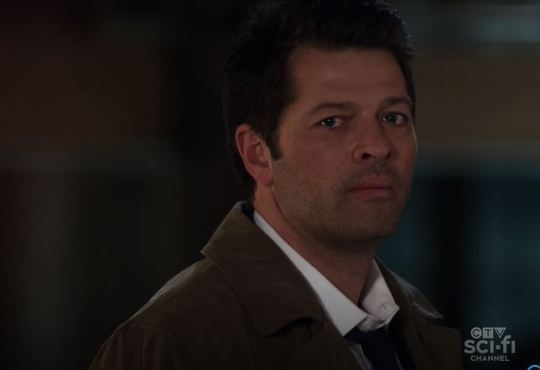
3. The many faces of Dean Winchester
On the other end of the scale, Dean was mostly silent after his poisonous words “And why does that something always seem to be you?”
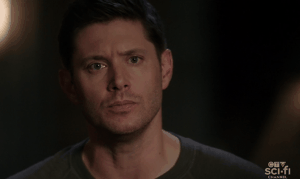
Forgive the terrible gif quality I’ve no time for fancy gif work!
Look at his face here. He knows what he said was fucked up and he immediately regrets it. The way he swallows around that regret and then turns away.
and after Cas says that devastating final line and walks away? We get THIS reaction from him:

The jaw clench as he looks down. The sorrow on his face as he realises he has well and truly fucked this up. LOOK
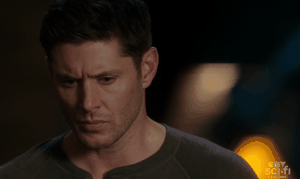
Finally, he looks up, makes himself look up and watch Cas leave. If that isn’t the face of a broken man I dunno what to tell you. Anyone who thinks Dean is totally heartless and uncaring right now needs to reassess because this is NOT the face of someone uncaring. This is the face of someone who has just lost everything. Again.
4. The FUCKING MUSIC
Seriously. The sweeping heavy drama of the low strings that come in right after Dean says that horrid line, that carry the weight of the look of horror and heartbreak on Cas’s face as they amplify the emotion there. As they blend seamlessly into the slow and subtle version of the Winchester family theme behind Cas’s heartbreaking speech and Dean’s stubborn stoic face hiding a multitude of emotion, until the violin dominates as Cas says “I think it’s time for me to move on” and the Winchester Theme swells to its climax, ripping all our hearts out just like poor Ketch as Dean watches Cas walk out of his life surrounded by darkness.
I MEAN.
A friend on Twitter reminded us all of this point about the importance of this theme via @justanotheridijiton here which is essentially:
“The Winchester theme is not simply an aural marker to let the audience know when and how Sam and Dean love each other (any Supernatural fan knows that is the baseline of their relationship), but to provide narrative information, especially when the image and dialogue are incomplete or inconsistent with the true situation... Seasoned fans will recognize the theme and its history of being paired with images indicating deep emotional bonding and a desire to do the right thing by the Winchester code. Here we trust our ears over our eyes to reveal the truth.”
So here is yet another key indicator that any surface read that this is actually an ending between Dean and Cas and that Dean really is just an angry asshole is utter bullshit.
Honestly, this was PAINFUL, but it was painful in the best way. It was 13x01 levels of pain, but this time it was Cas choosing to walk away which makes all the difference. Dean’s greatest fear isn’t his loved ones dying on him after all, but of his loved ones choosing to leave him. This was exactly the kick up the ass Dean needs in order to win Cas back, classic love trope style.
Hence my excitement at what is to come. Yes we won’t see Cas again until 15x06, but in the meantime I fully expect a good helping of angst and wallowing from a depressed Dean who has to deal with the fact that he has just lost the love of his life and it is all his fault. That he just pushed away the one person who promised they would always stay by his side. That has got to hurt.
So yeah, this episode emotionally destroyed me, and I’ve only really covered the primary reason, let alone all my feels over SamWitch, Rowena’s death, Belphegor’s taunting of Cas over his deepest fears and then having to suffer through smiting a creature wearing the face of his son until his body was nothing but a burnt corpse... I wonder if Bobo had a bet going in the office over how much he could hurt us all? He was certainly enjoying scrolling through the Supernatural tag on Twitter and liking everyone’s reaction tweets including some brilliant Destiel related ones. I do love Bobo. Our Angst Goblin King.
If anyone had asked me a few weeks ago what my thoughts were on the chances of getting explicit canon Destiel by series end, I would have said somewhere in the realms of 30-40%, considering it a battle of wills between DabbBerens and CW studio execs who I still feel are against it in general. I would have considered everything that happened after 13x06 as the writers getting a big NO on Destiel from the network and therefore having to pull back on any Destiel related plot points (purely my own speculation on BTS matters of course).
Now I am wondering if Dabb kept fighting the network? If he managed to wear them down into begrudging acceptance? I’m currently up to around an 80% chance of textual canon DeanCas if we continue on this path. If Dean is clearly shown to be mourning and hating himself over Cas next episode, and if this DeanCas dramatic plot line continues to be a focal point of the emotional story arcs... well...
I’m side eyeing 15x07 a lot right now. Only in my wildest dreams would I think that they might actually introduce an old boyfriend for Dean in a “coming out” episode, but the placement, timing, and potential is all there and I’m kind of once again donning the clown mask because I’m just in awe at everything that they are doing. I guess we’ll find out soon enough. In the meantime, I’m gonna paint my face in red and white and wear my rainbow wig and listen to break up songs on Spotify whilst trying to shove my heart back into my chest where Bobo Beren’s gleefully ripped it out with his hands like the demonic angst goblin he is. Wish me luck, I’m not sure I’m gonna get through this season with my emotions intact.
#destiel#supernatural#spn meta#destiel meta#spn speculation#season 15#15x03#castiel#dean winchester#spn spoilers#my meta#destiel dreaming#destiel break up
877 notes
·
View notes
Text
Final Fantasy VII Remake (PS4)

youtube
We all have a precious work of art in our lives that made a profound impact on who we eventually grew up to be, whether it be an album, a painting, a movie, or especially nowadays, a video game. Final Fantasy VII was that for me, and when it came out in 1997, it would go on to define my high school years.
Which would go a long way towards explaining why I never got laid during those said years. Le sigh....
All kidding aside, I never got laid in high school mostly because I was a mess when it came to the social scene. I had trouble connecting with others and taking what I perceived to be “big risks” like going to parties, joining after school clubs, or -GULP- asking out a girl I liked! I was very withdrawn socially, but I did have friends, and one of them, whom I’d consider my best friend, managed to get his hands on the original Final Fantasy VII before I even owned a PlayStation (I had foolishly bought a Nintendo 64, believing the next Final Fantasy was going to be released on that).
My friend and I were already very close, but we bonded even more as we experienced this new adventure together. He had his own save file that he was pecking away at, but he created a new one for us both to play whenever I’d spend the night or vice versa. The both of us were completely immersed in this world and these characters. It was one of a few positive experiences I can remember from my high school years.
The reason for this preamble is to make you understand how much this game means to me on an emotional level. So when the remake was announced years ago, I was extremely apprehensive. First of all, Square Enix is a pale shadow of its former glory as Squaresoft. Final Fantasy XIII was a goddamn mess and Final Fantasy XV was a step in the right direction, but hardly the stuff of legends like its PSone and SNES predecessors. The Kingdom Hearts games... well, I’ll eventually talk about the rest of those in my blog. Suffice it to say, I had completely lost faith in Square Enix as a company, whereas there was a day I’d play ANYTHING they released because I knew it would be quality.
So lets get to point - did they fuck up Final Fantasy VII Remake as well or is it an absolute masterpiece?
Well... that’s kind of a hard question to answer right now as this is only “Part 1″ of what I assume will be a trilogy of releases that comprise the actual FULL game. However, judging this game alone, I’m going to lean towards masterpiece... with huge “but”. I’ll talk more about that below and warn of spoilers before I get to it.
Make no mistake about it, though, Final Fantasy VII Remake (part 1) is a goddamn masterpiece. The care put into the game by the development team is evident from top-to-bottom, with even the most minute details from the original faithfully adapted. However, this isn’t a strict beat-for-beat retread of FFVII, nor did I expect it to be. While the game follows the basic story almost exactly, some tweaks have been made here or there to better pad out both the gameplay and the story as a whole. I had no issue with any of these changes, until the final chapter revealed the implications of them, which I guess I’ll discuss next to get it off my chest...
SPOILERS
During the last chapter, your party is confronted by Sephiroth outside of Midgar, who then goads you into entering the “Singularity”, where you finally fight the ghostly “Whispers” who have been stalking you throughout the whole game. These Whispers are a significant part of the new story “tweaks” that have been added, which I found annoying at first, but didn’t really mind so much as the story went on until now, because it is revealed that they are “arbiters of destiny”, whose jobs are to ensure fate plays out like its supposed to. During your fight with them at the end of the game, after defeating each Whisper boss, the characters experience “flash forwards” to important story points in the future, such as Aerith’s death and the summoning of meteor, implying that they have more or less nullified these events now as a result of defeating “destiny”... I think. Part of my problem with this portion of the game is Square Enix’s current “naval gazey, head-up-their-asses” story telling style is in full effect here, and I began to get Vietnam flashbacks to the completely incoherent plot of Final Fantasy XIII.
Square Enix, it’s so simple - part of why Final Fantasy VII endures is because it’s a great story ALREADY. By all means, give it a tweak here and there to give the characters more depth or make the story more dramatically impactful, but for the love of Jenova, please don’t tell me it’s going to turn into a philosophical shit show about the nature of destiny and fighting fate. More importantly, Square Enix, please don’t tell me you are going to change CRITICAL plot points for shits n’ giggles or to “swerve” the audience.
For one, Aerith has to die. I love Aerith, especially his incarnation of Aerith in the Remake. She’s so sweet and yet has a delightfully mischievous personality. She’s absolutely perfect. But the reason why her death still haunts fans of the game to this day is because THAT was the point in the story when shit got REAL. The stakes were raised and Sephiroth cements himself as an evil son-of-a-bitch that must be stopped. He doesn’t kill her just to be evil either - he kills her because she’s actively trying to foil his plans by using her white materia. However, unbeknownst to Sephiroth, her death is what ultimately triggers the white materia to work when it needs to most. It’s kind of like how Obi-Wan Kenobit warns Darth Vader “If you strike me down, I’ll become more powerful than you an imagine”, but in this instance it actually makes sense.
So that has to happen. It can’t be Tifa, or Yuffie, or Cid, or Marlene, or some other swervy “gotcha” bullshit - it has to be Aerith.
Secondly, Sephiroth must successfully summon the meteor - it’s in the fucking logo for crying out loud! I can’t imagine what “imminent threat” for the whole world they could do instead. Fat Chocobo gains a massive amount of weight and jumps on Midgar? It’s baffling to imagine the developers would even *flirt* with the idea of changing these important story elements of the game, so hopefully we’ve all just hysterically misinterpreted the meaning of the last chapter.
Oh, one more thing - the final boss fight with Sephiroth was dumb too, if only because it cheapens the eventual actual final boss fight with him at the end of the game. I liked how in the original he was basically a phantom that kept evading your party, leaving behind Jenova pieces for you to fight instead. It’s like how in wrestling, a heel character talks tough, but then runs away when the “baby face” comes out to confront him. Fighting Sephiroth now, not to mention beating him, kind of makes him look weak sauce. Ohh legendary SOLDIER, my ass - I beat him at the beginning of the whole story. To borrow from Star Wars again, it would be like Luke fighting Darth Vader in A New Hope and kicking his ass immediately. Vader sure wouldn’t seem like much of a threat after that.
Anyway..
SPOILERS OVER
God, sorry, this review is out of control and much too long, but I have a lot to say!
Okay, so my worries above aside, the game itself is very well done. The graphics are beautiful, despite the environment being a constant barrage of grey, industrial imagery (hey, that’s Midgar for ya). They find ways to change things up visually, depending on what part of Midgar you’re in, such as Sector 5 having more greenery than usual (cause, you know, it’s Aerith’s home, so that makes sense!). Wall Market, the “red light district” of Midgar, is a treat for the senses, especially at night, what with all the lights and the music playing everywhere. It really feels like a lively, party town.
One major change that had me, and probably a lot of FFVII purists, concerned is the combat system. Gone is the turn based combat of old, replaced now with a more fast paced hack-n-slash style reminiscent of a From Software game than Final Fantasy (though not even as remotely as sophisticated). However, I enjoyed the change, as this makes the battles much more engaging and fun, as opposed to the tedium that can come with turn-based combat, not to mention random encounters. You can still use magic, items, and Limit Breaks like in the old days, so it still feels like the original, but with tweaks that make it better.
And you know, that pretty much sums up my super long review nicely - the game feels like the original but with tweaks that make it better. Even the soundtrack is improved, which is a feat I didn’t think possible considering the original FFVII’s soundtrack is some of the best video game movie ever composed. The Remake does a superb job of weaving in certain themes and remixing themes at appropriate points in the story. “Aerith’s Theme” is more tear jerking than ever, while “One Chosen by the Planet” (otherwise known as Sephiroth’s theme) is even more chilling and fearsome than ever before.
So overall, I fucking loved this game. I rarely get emotional while playing video games, unless you consider cursing and screaming “emotional”, but damned if this one didn’t constantly give me warm and fuzzy feelings (especially whenever Tifa was onscreen - *growl*). I’m eager to play the next part and explore more of this “new” world, despite my concern it might be “too new” in the worst ways.
#final fantasy vii#final fantasy 7#final fantasy vii remake#square enix#ps4#playstation 4#sony#rpg#action#cloud strife#Sephiroth#aerith#ffvii
42 notes
·
View notes
Text
three movies that should have been boring, but weren’t
I’ve been doing short write-ups of movies as I watch them lately, and I realized that the last three I watched were all united by the fact that they seemed like the kind of thing that should have seemed slow, or uneventful, or overdone, yet managed to compel me anyway. So I thought I’d compile them, in the interest of finding similarities.
*
Girlfriends (1978). Directed by Claudia Weill. A very good movie. Most impressive for the way it does so much with so little. A good example of how even in a genre that I should find insufferably overdone at this point—the struggling young NYC artist figuring themself out genre—can still be great if the artist has a strong, individual attitude and the guts that come with it. All it really takes for an “ordinary” topic to be interesting is for the artist to know what they want. I loved how unselfconscious it was. There was no sense that it was performing to what some imaginary audience would find cool, which is so often the problem with these sorts of stories (unless it’s something like Girls, which makes performativity its subject matter). This is one of the things that I think allowed all of its seemingly simple scenes to not be boring. Even if simple, the character tension in them was real and important to the writing. Whereas in writing that is looking for approval, the characters become vehicles for that approval instead of actual characters. And if they’re not actual characters, then they lose their ability to generate tension. Because tension is generated by things like “I have a model of what this person wants. When they face a new situation, I feel tense because my model predicts something about how they’ll behave.”
The Apostle (1997). Written and directed by Robert Duvall. One of those movies where it seems like nothing happens and yet you’re absorbed anyways. At least I was. It actually seems like an artistically perfect reaction to have because the point of the protagonist is that he’s a charismatic figure that makes people believe in God, but doesn’t actually have any real spiritual insight. Not unless you go in for his brand of born-again Christianity, anyhow. The movie could have chosen a much more intellectually tempting or palatable version of Christianity, so I think it matters that it focuses on a version that needs emotion and charisma to distract you from the theological emptiness. A version that comes off as nothing but a bunch of repetitions of slogans and platitudes, as if saying things enough times and with enough fervor makes them true. Yet you get to the end of the movie and you realize you’ve watched more than two hours of this religious bombast. It feels like something has happened, even though nothing has. The man is still a murderer, still preaching away. He hasn’t really progressed, even though he probably thinks he has. His “ascension” at the end is into the lights of the police cars rather than the light of heaven. Basically, it feels like there’s this question throughout, echoed by the “empty”-yet-absorbing nature of the narrative itself, about whether meaning created in the mind corresponds to anything real outside of it.
Also: Duvall is incredible in the role. His character is one of those characters that could so easily descend into caricature or pantomime, where the bigness of the deliveries is more about flattering the actor’s ability to be big than portraying a character who talks that way. But Duvall gets it exactly right. Every delivery feels totally embodied and character-driven, which is vital for making the movie feel like a thoughtful exploration of something, instead of something with an opinion it wants you to know. It’s a great example of not-needy acting and movie-making. A caricaturish depiction would let the movie off the hook—would be about giving the audience something obvious to approve of (there’s that issue of approval again). Whereas depicting a person with a huge personality in neutral way forces you to think about them in ways that aren’t simple or easy. The way you’d think about a real person if you had more information about them.
Spring, Summer, Fall, Winter and Spring (2003). Directed by Ki-duk Kim. A very good example of a movie that is both successfully meditative and successfully absorbing. I’m not sure why it succeeds so well on those fronts. It has many many beautiful images, but there are plenty of beautiful dull movies out there. I suspect it’s because first, the seasonal structure of the movie gives it an excuse to change tones and build on itself, which prevents boredom. It puts you in the mood of a puzzle box. Second, and probably more importantly, each section basically plays as a fairy tale, or parable. And fairy tales and parables are a very compressed form of storytelling that play on very basic human truths. Which means that all of the beautiful images and meditative moods have something narratively and philosophically precise to hang on. They’re not there as compensation for the fact that the artist doesn’t actually know what they want or mean. The fairy tale quality is also probably what allows the movie to get away with such obvious symbolism without feeling trite. Because you expect the symbolism in a fairy tale to be obvious. But that obviousness also doesn't feel annoyingly didactic because the point of a fairy tale is not just to teach, but to convey some sort of truth along with it.
*
Setting aside the formal competence of each of these movies, which is definitely a factor in what made them able to keep my interest, I notice they all shared one important quality: they all knew what they wanted. And if an artist knows what they want, then the pace of a movie can be superficially slow, or the content can be superficially empty, or subject matter can seem overdone, and it will feel focused anyway. The artist knowing what they want also seems to go along with not trying to perform to an audience, which also gives the movies focus. A lack of pandering--even subtle, subconscious pandering--means that there’s nothing to pull you out of the narrative spell by reminding you that you’re audience member and an outside world exists. It also means that only the artist is driving the artistic decision-making, instead of both the artist and some model of the audience in the artist’s head, which means there are no conflicting visions to add bloat. Lastly, the thing about performing to audience is that it makes a movie predictable, because the whole point is to anticipate what an audience already knows it wants. But in a slow or overdone genre, predictability of execution (though not necessarily subject matter!) will generate impatience and kill the pace in the water. If you already know how a certain story goes, then the pleasure comes from the artist’s take on it. And if the artist is trying to give an over-familiar take as well as an over-familiar subject, then what is the point? This is why an individual style will make an action movie feel fresh, but a shocking twist will not, necessarily. The individual style derives unpredictably from an artist’s personality, whereas the shocking twist derives predictably, ironically, from a desire to not come off as predictable. Of course, this theory also means that shocking twist is its own form of overdone content that could still feel exciting and new if it came from a confident artistic place.
#posts: art#movies#movie: girlfriends#movie: the apostle#movie: spring summer fall winter and spring
9 notes
·
View notes
Text
Blue Velvet - Chapter II
Title: Blue Velvet
Genre: Fanfiction
Pairing: General Hux x oc
Rating: teen | up
Word count: 1671
Chapter (s): 2/10
Warnings: implied sexual content, making out, non explicit sex, some sort of emotional manipulation ???
Additional tags: original planet, original food, original alien characters
Symbols: ✔ | ➕ | ▶
Read the previous chapters here: Chapter 1

Chapter II - Remarkable
I surprised myself by catching the attentions of a mysterious man in the front row. When the show was over, I didn't want to stay and face the people of the audience, so I tried to leave the place before anyone noticed, but my plans ended up frustrated by the intriguing man, who introduced himself as a General of the First Order.
"Your name is for your life what a lightsaber is for a Jedi"
(Proverb from Odbeei)
He was in the front row, at my left. I’ve never seen him before; I had no idea of who he must be. The only thing I knew for sure is that he was someone with a considerable level of importance, by the fact that he was there. However, something made me concentrate my attention on his figure, and under the appropriate limits, I started to observe him.
He certainly was not from Odbeei. His posture, the color of his skin and stuff like that made it clear he was a foreigner. Besides, his clothing style didn’t follow the planet’s fashion: unlike the vibrant tones we used to wear, they were black from head to toe, made with heavy fabric, accompanied by leather gloves and boots, like what we see in the closet of any inhabitant of cold regions.
I don’t know how long I’ve been looking, but I was sure it was for just a few seconds. Maybe time had deceived me, because someone at his side touched his arm, and his eyes turned to the stage, finding my own with the celerity of a blaster shot. I lowered my eyes at this, aware that my face must got as red as fire. For some kind of miracle, I managed to keep singing without messing up a single note after that.
At some point when the end of the night was approaching, I had the audacity of look at his direction again. I confirmed my suspicions: he had his gaze on me, and I also noticed that, while trying not to turn it away, he leaned toward a man sitting by his side (and who must have come with him, for he followed the same dress code) and whispered something; the man gave him a quick answer and he nodded, returning to his original posture and dedicating all his attention to the stage.
***
The people responsible for the financial matters of the club had the code of my bank account, so there was no need to discuss about the cache. I have to say that I used to find it quite an unpleasentness when I dealt with less prominent clubs, but with houses like that I’d have nothing to worry about.
I walked back to the room that was reserved for me as soon as I could. I removed my makeup, changed my clothes and prepared to leave the place, without questioning if it wasn’t appropriate to stay and socialize with the people of the audience. You see, I received no instructions on this matter, as well as I had no interest in playing this part. There was not much that people like that could say or do to keep me entertained, for their behavior would always lead them to one of these three lines of action: they would talk between them and treat me like I was a part of the scenario, or they would try to flatter me (though I can’t see what they could get from that) or – the worst of all – they would try to get certain services from me that I had neither the need or the intention to offer.
Outside the dressing room, I asked a woman of the staff for the less crowded exit corridor, and after her instructions, I followed toward there. It was a long corridor, as illuminated as much as the other places, and its floor was covered by a soft carpet.
This detail didn’t let me notice I was not alone there.
- Is the mysterious vanishing a part of the show?
Though I still didn’t know his voice and my ears got a bit surprised by his foreign accent, there were no doubts about who had spoken.
I turned to find him in the middle of the corridor. I must've let a considerable astonishment show, because he smiled at the possibility of seeing me run away without answering his question, and started to walk toward me, his steps unhurried, his hands behind his back. However, like something in his way were attracting my eyes to his spot in the audience, now the same thing, trait – I don’t know how to call it – didn’t let my feet move.
It was only when he stopped before me that I noticed how young he was; it was strange that even being able to do a good examination of his appearance, I didn’t have connected his person to something like youth until now. Perhaps because of his seriousness, or the unusual black clothing, or something else. Something that had nothing to do with the superficial, but with the inner self. He was a head taller than me; shaping his face there was an impressive jawline; his rosy lips didn’t seem to be used to spontaneous smiles, which didn’t make them any less pleasing to look at; the blue shade of his eyes was almost transparent, if compared to the natives’ eyes; his hair had an exotic orange tone, and his skin was pale like the skin of someone who spent several months of the year away from direct sunlight. None of these were common to the people of Odbeei.
Finally, I could speak.
- The mysterious vanishing is just... a mysterious vanishing, Sir.
His smile widened.
- I see. Social demands scare you.
- No. They just wear me out.
The counterpoint didn't make him lose his temper.
- However, it would be a shame if you left without hearing a single word about your performance, Miss. Allow me to say that it was... Remarkable.
I know I blushed, and I couldn’t do anything about it.
- Thank you, Sir... – that was when I noticed we didn’t introduce ourselves; I saw a strange badge on his coat, right upon his forearm: the same symbol I saw on the holonews early that day – I suppose you are a member of the First Order?
He soon offered to respond.
- You are right. My apologies for not introducing myself in an appropriate way. I am General Armitage Hux – he offered me his gloved hand – I hope you don’t mind telling me your name, Miss.
I touched his palm with the points of my fingers; I couldn’t help thinking of it as trap when his hand clenched around them. But the grip wasn’t strong, and I saw no reasons to untie it.
- I believe they announced my name before my entrance, General. It’s Lilly.
Then he held my hand a little more firmly.
- No. What I’m asking for is your real name, Miss.
For a moment, I was unable to move or speak. I don’t know if what startled me was the question itself or the fact that he was aware of the name culture that existed among our artistic scene. Today I understand that this rule was never exclusive of Odbeei, but for some reason I didn’t think someone like him would care about these matters. Well, at least he must had not understand how unusual it was to ask an artist their real name.
But the question was not rhetorical, and I heard myself revealing my name to him, something I’ve never done since I came to that city.
- Lorna – I whispered.
After a long time not using it, the name my parents gave to me sounded weird to my own ears. I thought I wasn’t convincing, so I repeated it, more for myself and less for him.
- My name is Lorna – and added – It’s not the most charming name you’ll hear in your life, Sir. Now you understand why I don’t use it openly.
He smiled. He didn’t hurry to answer; instead, he lowered his eyes to our hands, united, and took mine to his lips. They were warm – not cold as one part of me insisted to imagine as soon as I could see him so close. I believe he took a bit longer than what’s usual for greetings of that kind, but the discovery of that detail about his lips suffocated any discomfort.
When he straightened up, his answer was just like his kiss.
- I understand that no name can be charming if the owner is not. Whether it is the name you were given, or the one you have chosen for yourself.
I didn’t know what to say to that. I didn’t know what to think, neither about what he was saying or what he was doing; that was such an unusual man, and I think he would be in any planet he would put his feet on. I found it better to end the conversation and say goodbye.
- If you excuse me, Sir, I need to go now. I’m really tired.
That was true, but I’m not sure if my justification convinced him. Anyway, I was determined to go away at that moment, and it didn’t go unnoticed by him. The General let me remove my hand from his and put his own behind his back, taking a step behind and nodding.
- Go. A time for rest is more than deserved after an exciting night like this.
He said this more calmly than it was conceivable, or maybe I was so tired as I wanted to look and thus unable to judge his tone with precision. I nodded and turned my back to him, hurrying to reach the exit door. When I first breathed the fresh air of the night, my heart calmed down and the strange sensation in my throat was gone. There were still some people of the public lingering at the club’s surroundings – probably those ones who exceeded themselves with alcohol – but I did my best to avoid them and ran to the nearest public transport station.
For the rest of the night, after spending hours awake, lying on my bed, I kept thinking about how strange that he showed no hurry in his treating. But it was only a few days after that the reason for that became clear.
He was expecting to meet me again.
#star wars fanfiction#star wars#armitage hux#armitage hux x oc#general hux#general hux fanfic#general hux x oc#ao3#ao3 fanfiction
4 notes
·
View notes
Text
💧&🔥
Just a bit of Cursed/Nimulot analysis… Cause I’m bored. And I might have found some interesting parallels/imagery watching it through for the 7 billionth time that I would love to share. If anyone enjoys writing meta… Which I mean I know some of y’all need your fix… Feel free to use anything/expand upon it. I would, but I’m a new fur-mumma and she’s taking up all my waking hours, so this little shit-post about this new hell hole of a ship I’ve dove headfirst into will have to do. The images are from a video and show produced by Netflix, I own nothing, so pls don’t be a bitch about it Tumblr.
***SPOILERS FOR THE SHOW!!! WATCH IT AND COME BACK!! OR DON’T? ANYHOO YOU’VE BEEN WARNED!!*** ⚠️
- beware Tumblr app users, it may be your doom -
Where to begin, with the teaser? Or with…
THE SHOW! Here be just a wee few times the writers/director(s) through the writing/cinematography have mirrored these two ‘protect the kid - warriors till the end’ idiots. I’m sure others have picked up on them… Not in any particular order, here ya go anyway.

1x02 - 1x10
*Insert spiderman pointing at spiderman meme*
One scar made by an actual dark god tricking her when she was a child, the others by a very human evil tricking him when he was a child and the consequences for both lasting into adulthood.

1x02 - 1x10
Look at the years of trauma Anakin, look at it! They even use the same damn word! The phonetic tones of disgust! The outcast syndrome! Oof. (And it’s not like Nimue being called demon has to do with a general racial-slur from a human, that is a fey calling her that from her own village!) They both grew up viewing themselves as “demons”, the “abominations”. Even their expressions are the same, fear and sorrow and self-hatred. All they both want is to be accepted! (By their fathers especially). To be loved.
The two who are “cursed.”

1x02 - 1x01
*says nothing*

1x04 - 1x01
“Where to begin? With water or with fire?”
Where to begin? WHERE TO BEGIN??? *dies*
Water ☯ Fire
Sword up ☯ Sword down
Light/Day ☯ Dark/Shadow
Life & Death (Life around her, death in the water) ☯ Death & Life (forest fires make way for new growth)
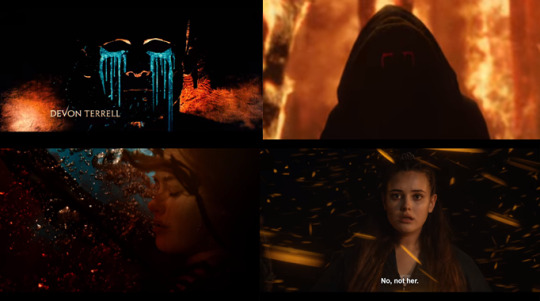
Long bit: Both characters are associated to the elements of water and fire individually through the environment/cinematography/colour pallet/colour symbolism, and then water and fire is mirrored between them. She is overall water, he is overall fire; but they also have a bit of the other in each other.
For Nimue this symbolism is often done through her environment, showing her connection to nature as the fey queen and that she does not hide who she is if she can help it. She does not hide externally, so her elemental symbolism becomes EXTERNAL.
Whilst for Lancelot though he is often surrounded by fire, the idea of water/tears is either symbolised through the fairy tale style of the artwork or referenced for him through his name as “the weeping monk.” Hinted at in his characterisation of guilt and self-loathing, the way other characters respond to him (”the one who cries”/”you see it all through those weeping eyes”). His main conflict is an Internal fight between who he is and who he needs to become, so a lot of his main symbolism surrounding water (and even fire as pertaining to magic - ashfolk - and not killing fey) is INTERNALISED, hidden, cut off from the Hidden themselves. Symbolic of him hiding his connection to the fey and that other side of himself, the “human” (morally speaking) side, and therefore hiding who he truly is… Lancelot.
For Nimue, fire means life. Being chosen and her magic saving people. For Lancelot fire means Death, his deeds, “the fires of hell” and the destruction of the “ash” folk and his heritage. He believes hell fire is his fate, going by the “even if I am damned.”
For Nimue, water means death. In the water she takes revenge, where that Paladin almost drowned her. Into the water she falls, where they think her shot dead by arrows. The water is her fate as the Lady of the Lake. For Lancelot, water means life. Tears, emotions, taking responsibility, feeling the weight of his guilt and mourning for the things he has done/lost. For him, water - not ash -means a second chance to be better. To put out the fires and heal.
Though in the end, for both of them, water & fire most of all represent death and rebirth.
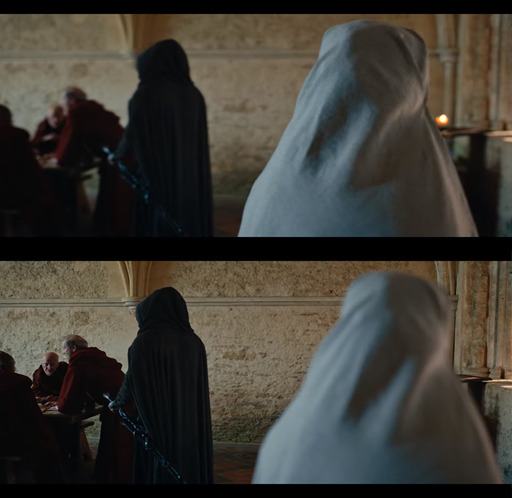
1x03
^If you don’t understand I can’t help you. ☯
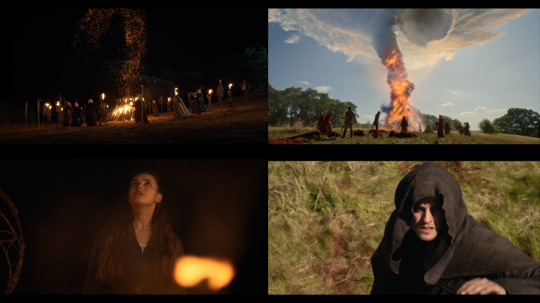
1x01 - 1x07
Now this one I found quite interesting. Remember that even if Nimue directed the second one, it is still the Power/will of the Hidden at play. (Or should I say the will of the Writers/director) Chosen? Mirrors? Night and Day? Fire… Embers to Ashes? We shall see, but I think it was definitely on purpose.
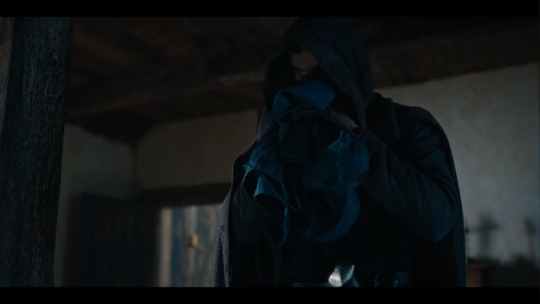
^I’ll just leave that here, the fuckers kept missing each other for an entire season (WHICH WAS ON PURPOSE THE WRITERS DID THAT ON PURPOSE just as an fyi). The fact that there is this much sexual tension, anticipation, mirroring, fate, destiny and chemistry between two characters who have never even mET should be ILLEGAL! They affect each other immeasurably without ever even meeting, so imagine what will happen when they do...? *pterodactyl screech*
Whelp there ye go. Under the next gif I also did a bit on the Teaser trailer, as that just fucked me up a bit I have to tell you! Up to you whether you want to continue digesting my mad ramblings or not. *Shrug* Thanks for coming to my TED talk guys– 😂 Somebody fucking smite me down like the eldritch horror of writing I am dear god think of the children…
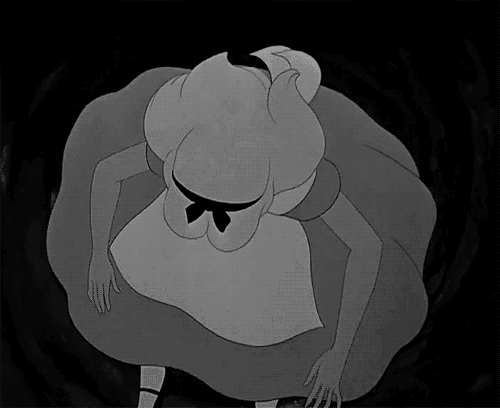
THE OFFICIAL TEASER TRAILER:

Arthur running for the Sword of Power, because you know, King Arthur.
“The Legend says…” The Legend of King Arthur and his Sword Excalibur/Caliburnus? The line is very meta, a reference to the in world legend that this story will create, but it’s also expecting the audience to be savvy of the actual legend of King Arthur and his knights. Both these ideas intertwined into one. Aka, the trailer expects us to have pre-decided expectations for the story we’re now being told, because we’ve already been told it before; this fairy tale of celtic myth/history. All the “spoilers” about Arthur, his lineage, Morgana, Guinevere, the Knights, even the lady of the Lake herself come with that knowledge. However…
Surprise surprise, the Weeping Monk (killer of fae)/ Lancelot (eventually Arthur’s most trusted KNIGHT) instead picks up the fae sword from it being embedded in the ground, subverting our expectation, it definitely fucking subverted mine, but not in a GOT way, in a ~good~ way. I was like, “Whosoever be this fine hooded fellow hath stole away both sword and my good sense!!! 👀”
Also harkening back to the legend of the sword in the stone (another expectation), which the action itself signifies that person be - as Merlin so eloquently puts - “The one true king.”
Ok… Symbolic wink wink nudge nudge towards his true nature (inside and out), saving Percival, potentially becoming the greatest warrior and protector of his people and eventually a Knight of the Round Table; and perhaps King of our Hearts??? Ok, sure thing “concept” trailer. I’ll bite.
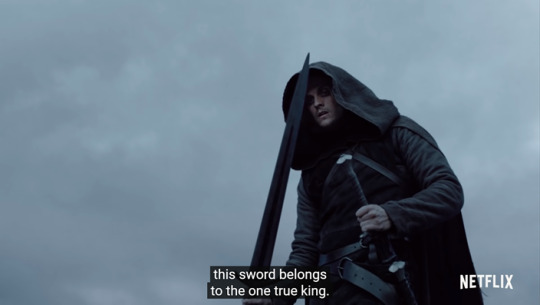
Ok… *deep breath*
WHOMSt the fUCK decided to frame (fae “ashman”) ?Lancelot? with the ~SWORD OF KINGS~ (also of fae origin) A N D the line…‘the one true king’ ALL IN ONE… instead of Arthur?
‘BELONGS to the one true King?’ Belongs, hmm interesting word choice… This done in a worms eye view shot meant to make the viewer feel like the character is above/superior/basically we’re kneeling before them? (Which I mean sure? but…) Hmm??? HMMM??? I don’t understand CONCEPT Trailer what is the CONCEPT you’re trying to get across? One hand on his paladin sword and the other on “fae hope” Excalibur I get, he has to make an important decision, one that will either save his humanity (and his people) or destroy it (them), yeah yeah sure that’s F I N E…
…but what about the “KING” SHIT HMMM?? Is there something you would like to share with the rest of the class? *sips tea whilst staring straight into the camera*
it may mean nothing don’t quote me
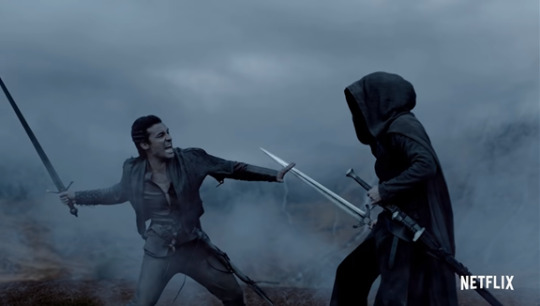
…Anwaaaay… We all know in a fight Lancelot can kick Arthur’s ass so that’s not whats going on here. Arthur is P I S S E D. They’re not just bog standard enemies here. I mean WPM kicking him in the ribs was pretty “fuck you” and they were just enemies there. In this instance the sword is in play, Weeping Monk has taken something from Arthur that he feels “BELONGS” to him - in this case symbolised by WPM taking “his” sword - and that’s making it personal.
“You stole my sword ya bitch!” And what is the sword linked to? Power? Sure. The right of being a King? Yep. And also a certain Queen… No no no, this is the Concept of rivalry. It shows that whatever relationship Arthur and his “Knight” will have in the future after all the “die die die” starts to sizzle down will - in its genesis - be a rivalry. Probably mirroring Gawain and Arthur when they first met to an extent. A rivalry for power? For something else? Who Knows!
*whistles innocently*
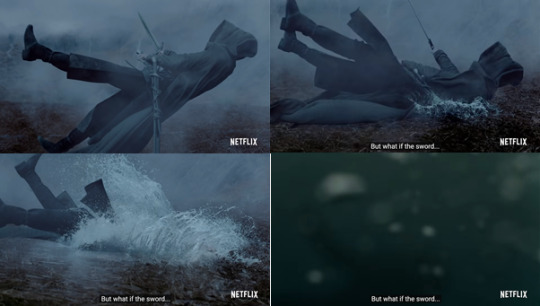
And down down down he goes. He’s FALLING. There are many metaphorical concepts associated to FALLING… Falling from “grace” (in the eyes of the Church)… Falling because he has a sky full of guilt crashing down upon him… falling for h… falling in Lo… into the Water!!!! Until he is completely submerged. Water, the idea of cleansing, of washing away who you once were/trauma/sins of the past so you may be reborn a better version of yourself. His old ideals are defeated, he submits to his true heritage and allows it to wash around him so he may begin to heal.
Though if we’re talking metaphors, water is - for obvious reasons - always associated with the LADY OF THE LAKE… Nimue. He has fallen into her world. (pss he’s gonna fall for the Chick in the Lake - I think - there ye go). Water is associated to memory/reflections and mirrors. And he is CRASHING through this mirror… This idea of reflections/mirror images is even more ironic when you’ve watched the show.
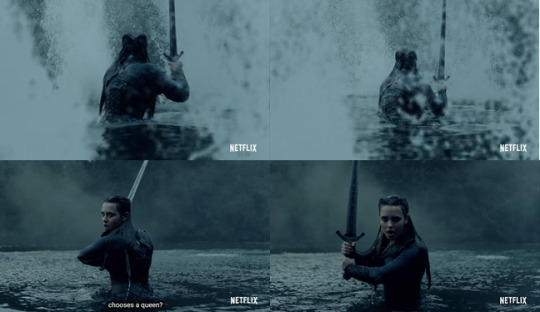
And as he falls beneath the water with the sword of a King, she rises out of it, with the sword of a Queen… Mirror mirror on the wall, who’s in the biggest shipping hell of them all? Either these two are going to be really good at relay, or there’s some conceptual significance here. The specifics? No fecking clue, will need to wait for a season 2! There is also some interesting use of Z~oo~m in this last bit, but I’m sure it’s pretty obvious to you all. Summary: just visually in a concept “teaser” trailer, the zoom in on them both, the reverse mirroring, the literal and symbolic visual of water and the Sword (of rulers) connecting them frames these two characters together, that’s just in the concept trailer. Links their legend together. TBH IT LITERALLY LOOKS LIKE LANCELOT FELL INTO THE WATER AND TURNED INTO NIMUE WHAT IS THIS GREEK SOULMATE SHIT I’M–
*calms down* This trailer and the show also definitely said to the original Arthurian Legend “RIP but I’m different.” I mean, Nimue is definitely not Lancelot’s mother figure in this one, that’s all I’m saying.
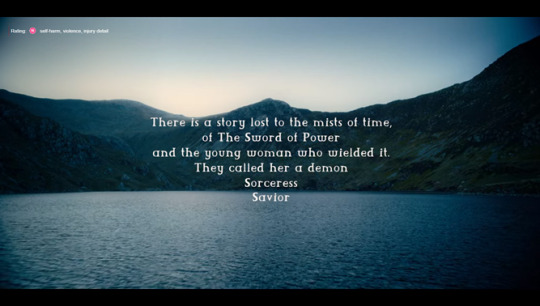
I think this legend might be a wee bit different 😉*cackles*
#nimulot#nimulot meta#nimue x the weeping monk#nimue x weeping monk#cursed spoilers#nimue x lancelot#my meta#mad mimir meanderingly mumbles#Tumblr is my only escape for this - I wouldn't go near twitter with a thousand foot pole if my life depended on it#where to begin? I don't think I'll ever get over that line - I die every time#my pupper was literally like 'mum what the fuck are you doing writing this shit give me LOVES'#also Nimue owns my heart if Lancelot doesn't marry her I'm going to thanks BYE#my shitty humour~~
1 note
·
View note
Text
August ‘20
Ruiner
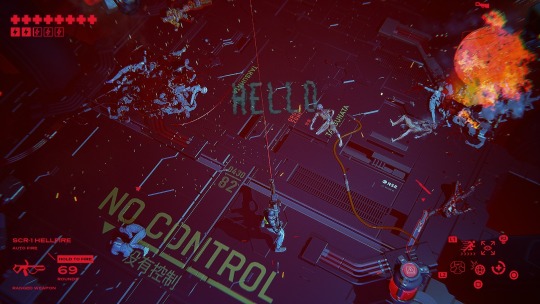
Ruiner frames its action at an isometric tilt. There’s a lot of red; in the game’s interface, as the prominent colour of the neon lighting that adorns its stages, and in the blood that is frequently spilled. Its cyberpunk setting isn’t anything particularly new, but as a unifying aesthetic, the glitchy effects, and out-there personalities doing their best to cope in a dystopia do well to build a convincing and intriguing world. Stages are action packed and throb with electronic noise and big loud industrial bass hits, with the play being akin to an arena shooter; enemies surging at you in bite size, minute-at-a-time waves, with each of these closing out with a grading screen serving as the pat on the back to keep that dopamine rhythm pulsing. It’s a pretty hypnotic cocktail.
These stages evolve out of a singular hub city, and while it’s not particularly big, there’s just the right level of hubbub, and it has a lovely Hirusawa Susumu track acting as an excellent, melancholic mood-setter. Based on the size of its world and the the quick-fire action being split between a very small number of stages, it’s not surprising to say it’s fairly brief - I mean, how could it get so big? But what is important is that it’s plenty of fun and and has style by the bucketload. I got a good kick out of it.
Carrion
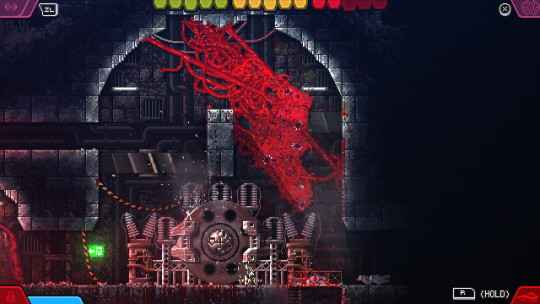
On one hand, a horror game where you play the horror is just the kind of flip on a genre that’s needed to freshen things up a bit. On the other, it’s one straight out of the spoof ‘Peter Molydeux’ playbook. What a carri-on.
... I’m sorry. After your initial escape from a lab, Carrion centres around a hub world, with individual stages then breaking off to allow for more specific themed stages. What you’re trying to do within these is to spread your big, goopy self around, where certain spots will act as save points but also count toward unlocking an alternative path back to the hub and opening up new routes in the process. What’s unique to this particular metroidvania take is that while there are new skills that open up new routes, your movement in general is uniquely freeform - point in a direction and off you go, free of any worries about platforming and the gravity that’d otherwise bind you. While it may not be the most precise movement given the size to which you grow - and boy does this become a point during some forms of combat - it does remain responsive, and quite fun to simply shamble about like a giant congealed blob of bloody, multi-toothed sinew-y mess. Everything scales up nicely on both sides of the fighting, with distraught pistol-equipped humans turning to shielded folks with flamethrowers, all the way up to drones and mechs that are just as mobile and / or deadly as yourself, even in spite of your own upgrades that allow for more ranged, varied, and sharper extremities. It’s not especially long, and is never so taxing as to demand too much expertise of you, but it is fun and importantly, quite unlike anything else out there.
Yoku’s Island Express
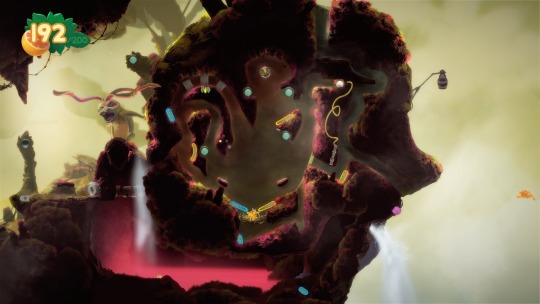
Pinball continues to feel like a lost art form to me, with the nuance of skilled play being more like a foreign language than another type of game you can easily pick up. Yoku, newly-appointed postmaster, is but a tiny little bug, and as such is indebted to these skills in his efforts to travel and clamber about an environment much larger than he. Flippers are casually littered about to shoot you from one area to the next, but there’s also plenty of sections you’re led to by the story that are small yet just detailed enough to play like a neatly sectioned off area of a complete table - complete with requirements for precise shots to move forward, and those inevitable moments where you have to sit back and watch as your ball falls with miserable, exacting precision between the flippers. Failure typically sets you back a few pickups, but given these are just as quickly re-earned, you’re never punished too hard - there’s certainly no three strikes and out mentality here. It’s a very friendly interpretation of pinball’s mechanics, and there’s a decent enough story layered on top, with its characters and art demonstrating enough pleasant charm that you can definitely see this being a great way to introduce pinball to a younger audience. That’s not to say it’s not enjoyable from an older player’s point of view - just that you know what’s being presented is a wisely palatable version of a classic hobby, rather than the arse-kicking ordeal you may be used to.
Rime
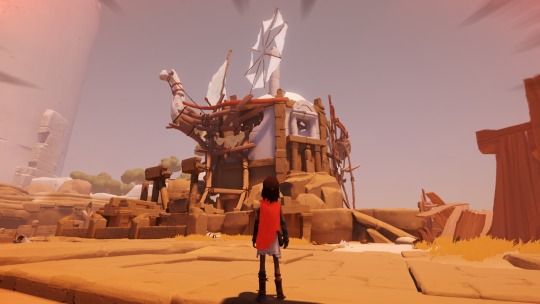
I am certain that Rime would love me to compare it to a certain Fumito Ueda PS2 game. There’s the ultra-minimal scene that’s set as a boy washes up on an island; a sparse, beautiful, somewhat Mediterranean set of landscapes, and with very few ways to interact with it all that don’t involve clambering over things or shouting out in wordless desperation. But as you’ll have noted, I haven’t found it in myself to justify using that game’s name here.
As much as I wanted to give this a chance, it often felt directionless, uninspired, and at worst, slow and tedious. The puzzles are derivative of any number of games I’ve played before, and the biggest danger is that you might assume as to their difficulty and over-engineer your approach, rather than not be able to tackle them. The platforming is simplistic and regularly drawn out with ledges, ledges, and more ledges to climb across and dangle from; even if you were to find a way to fall to your doom, as is tempting, it is unlikely to take you back much further than a few seconds. Crucially, there’s really very little to sink your teeth into on any front, and even when the game does finally start to weave some plot threads into the game’s canvas, it’s well into the latter half - long after I’d already racked my brains for any hint of an allegory that’d fit, and given up on expecting one. Sadly, to the point that the actual story felt like a cheap afterthought when it did finally start to unravel. This bounced off me much harder than I’d expected - I came away wishing it had forged a bit more of an identity and a purpose rather than just an aesthetic strung together with some weak elements of play.
If Found

As far as interactive elements in visual novel-type games go, If Found has a different approach to most. The story’s primarily told by means of a diary - one that’s full of witty observations, personal reflections and enigmatic sketches - that you actively erase as a means to push events along. The diary belongs to Kasio, a trans girl returning to their small Irish hometown after a stint away at university in the city; a return that’s not met in the warmest or most understanding fashion. As a mechanic, the erasure of this diary is loaded with meaning; peeling back layers of a scene often matches a more poignant set of observations, and the scrubbing of such personal details away offers a painful reflection on an identity being chipped away at. It’s very much a story about finding one’s self, about coming of age, and as it rides these highs and lows it does an excellent job in making you ride along these alongside the characters, and it does one hell of a job to make you think about the compassion that you both see and offer in the world outside. I’ll put my hands up and say that there are some elements of the story running in parallel to this main one that didn’t gel with me quite so well, but this is a minor footnote to an otherwise highly enjoyable play through. In a short space of time, Annapurna have done a great job in winning me over with their publishing choices - particularly in holding up the kinds of voices and ideas that fit these smaller titles so perfectly.
Double Kick Heroes
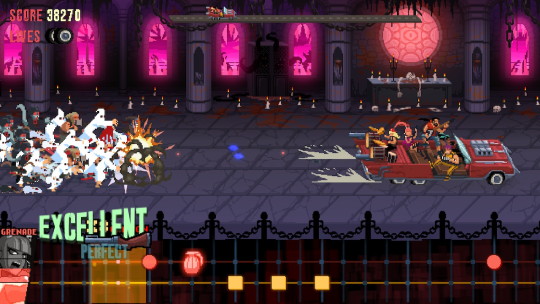
It’s a rhythm game. I like rhythm games! It’s about a zombie apocalypse. Oh no. It’s... a heavy metal rhythm game? Ok, maybe we can work with this.
After a trailer name dropping a bunch of familiar artists - Jinjer, Carpenter Brut, Gojira - what surprised me straight off was that none of these licensed artists featured in the game’s story mode. They’re all sectioned off in a separate menu, and while on the bright side they’ve each given a unique stage with a visual theming in keeping with the bands in question, it feels like a bit of a missed opportunity. Instead, all tracks throughout the story were composed by just one person, and with only a small handful of featured musicians being included to diversify things. It starts with more (arguably) palatable hard rock numbers, but goes up to and includes grindcore, death metal, black metal and the like, meaning that not only is it going to put a lot of folks off right away, but that it’s asking a heck of a lot for one composer to cover all of these sub-genres with the appropriate care. While it was refreshing to hear some types of music I’d normally not expect to hear in a game, some tracks inevitably grated, and while I enjoyed some others, I wasn’t ever bowled over too strongly either.
The story itself is fairly by the numbers. It sees an on-tour band fighting back against a zombie uprising, and has unsubtle references to any number of heavy artists, albums and songs shoe-horned in at every opportunity. It also bears the hallmarks of its dialogue being written by someone that has a very particular sense of humour which personally all fell very flat. While the team undoubtably do love music, the over-enthusiastic style rubbed me in a similarly uncomfortable fashion as Jack Black does regularly, with his half-comedian, half-musician schtick. The gameplay itself is based around the drum parts of its songs also corresponding to different weaponry on your car that holds the hordes back, and while this on its own can prove tricky, higher difficulties also mounts other expectations - like steering your vehicle, or alternating pedals to shoot different parts of the screen. Some of my frustration with all of this is likely my own fault for having chosen to play on the ‘Hard’ difficulty, but traditional wisdom feels a little bit lost when you can still get damaged when your combo meter is racked up well into triple digits.
In all, Double Kick Heroes presented some pretty unique gaming scenarios; like having to work out the best controller configuration to play blast beats with, or asking out loud “did I just hear the words ‘we are Genital Absolution’ coming from a Nintendo console?”, and it’s clearly a small team working on something they really care about. I respect that. I didn’t enjoy it as much as I was hoping, but I hope they’re proud of what they’ve created.
Manifold Garden

A puzzle game taking significant inspiration from the works of M.C. Escher is a pretty good starting point in my eyes. It being presented in a wonderful manner certainly doesn’t harm either; from the UI all the way into the game, it’s beautifully clean and defined, opting for delicate shading rather than messy textures, and with its intricate, recursive geometric patterns, you’ll likely find cause to stop and take stock on a regular basis.
One button looks after your basic interactions with the world (pushing, picking up, and so on), with your other crucial way of interacting with the world being the ability to approach a surface and then assign it as ‘the new down’ - spinning everything about an axis, planting your feet to it, and changing your perspective on everything. There’s a nice steady introduction of puzzle pieces as you ease your way in, but they all stem gracefully from these simple mechanics. That I - not the world’s greatest puzzle gamer - was able to enjoy this without every getting too stuck may hint at it perhaps not being as complex as some puzzle fiends might desire, however this amounted to me coming out the other side with great waves of satisfaction, and nought but positives to say. I would go so far as to say that it’s the most fun I’ve had playing a puzzle game in a long, long time, and to boot it’s also perhaps the game where I’ve used the screenshot button the most copiously. Wonderful stuff.
1 note
·
View note
Text
Thursday Thoughts: The Right Medium For The Right Story
I’m a bit obsessed with the topic of adaptation – and by “a bit obsessed” I mean “I wrote my undergrad thesis about it.” Adaptation is a kind of re-telling; you take a story that was told before, and you change some things when you tell it again.
For example, West Side Story is an adaptation of Shakespeare’s Romeo and Juliet. It’s the same basic story, but it’s set in 1950s New York instead of 1300s Verona, and the warring “families” are rival gangs instead of members of the nobility.
But there’s another kind of adaptation here that’s perhaps even more important than the change of setting – the medium. While Romeo and Juliet was originally a stage play, West Side Story was a musical, and later adapted again into a film. Adapting a story across mediums changes the work just as much, if not more, than anything else – or, at least, it ought to.
Minor spoilers for The Hunger Games books and movies as well as Disney’s Aladdin and The Lion King ahead.

[Image: The Hunger Games movie poster]
A Rose By Any Other Name Is Different
As a writer, I firmly believe that you must find the right medium to tell a story in. If you later change the medium, then something about the story is going to need to change as well. As much as a reader might want the film of a book to be completely loyal to the original text, a story originally designed as a novel is not going to work if you simply transfer it page-for-page onto the screen. This is because there are fundamental differences between books, a textual medium, and films, a visual medium.
My favorite example of a book-to-film adaptation that shows a clear understanding of the necessity of change is the Hunger Games franchise. Suzanne Collins’s books are told from a first-person perspective, giving the reader insight into Katniss’s thoughts the whole way through. Because we are hitchhiking along in Katniss’s mind, we get a lot of exposition about the world through her memories, and we know exactly what she thinks and feels about everything that’s going on. Importantly, this includes her confusion about how much of her affection for Peeta is real or just for the Capitol audience.
The Hunger Games film, on the other hand, is shot in a traditional third-person manner. Consequently, in the adaptation process, we lose Katniss’s point of view. We don’t get so many of her memories, aside from a brief dream sequence. We also lose her inner conflict about the performed romance (though the sequel, Catching Fire, plays catch-up on that point).
The filmmakers could have tried to make the film more like the book by adding a voiceover to explain what Katniss is thinking throughout the film, to sidestep the limitation of not actually being inside Katniss’s head anymore. Plenty of films do that. But The Hunger Games does not.
Instead, the film leans into the differences between the two mediums, seizing the opportunity to explore things that the book could not. While we lose Katniss’s inner voice, we gain everything that Katniss could not see. We get scenes of President Snow talking politics with Seneca Crane, making the viewer aware of the greater stakes of Katniss’s behavior in the Games much earlier than Katniss herself is. We also see the riots in District Eleven as they happen, instead of learning about them much later. In the third film, Mockingjay, scenes of Katniss’s work creating promotional videos with the rebellion are paired with the actual acts of rebellion that her words have inspired (I particularly love the “hanging tree” sequence at the hydroelectric dam). The effect is haunting, and it all truly drives home the magnitude of what’s going on.
As a result, the Hunger Games films remain true to the heart of the story without trying to shove a square peg into a round hole. A rose you read about in a novel might smell just as sweet as one seen on film, but only if you acknowledge that you can’t depict the rose in the exact same way in a book as you would in a movie.
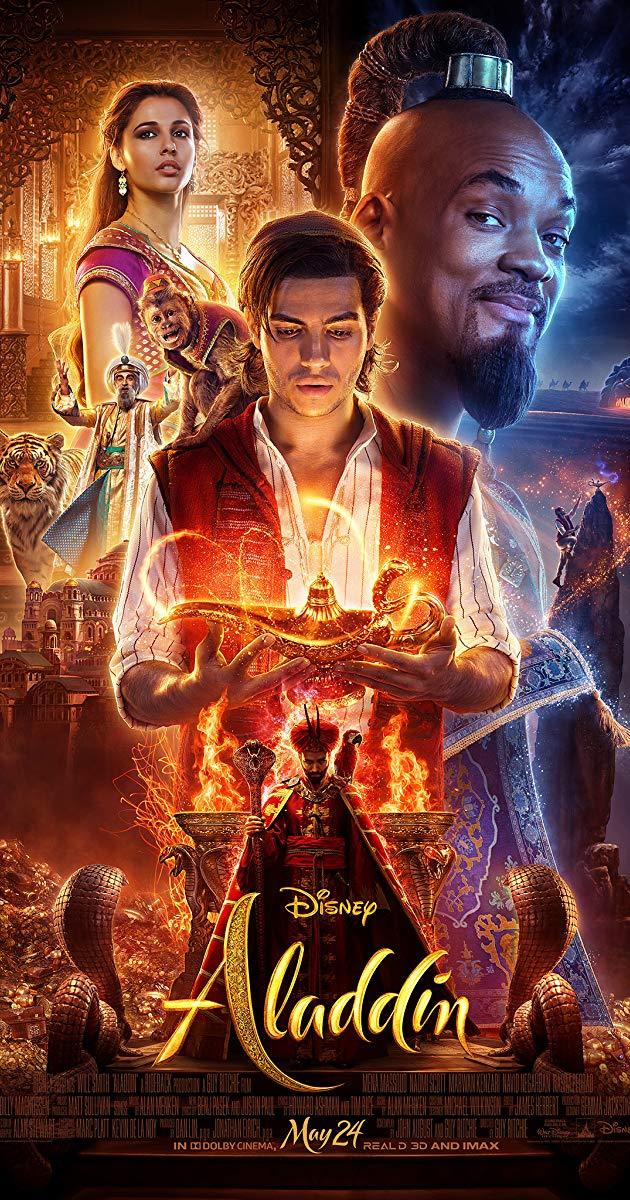
[Image: The 2019 Aladdin movie poster]
Anything Is Possible… But Not Always
The current trend of live-action Disney film adaptations provides us with a fascinating case study in the power of adaptation, and of how well the adaptors succeed in transitioning a story from one medium to another. The original animated films (which themselves are mostly adaptations of oral fairy tales – but that’s a whole other blog post) and the new live-action and/or photorealistic CGI films are, of course, both films. But the kind of story you can tell in traditional animation is different than the story you can tell in a more realistic “live action” style.
(Not to mention that the kind of story you can tell in a mainstream media production today is different than the stories told twenty-plus years ago, representation-wise… but again, that’s a whole other blog post.)
Animation is a medium of imagination. That’s why animated fairy tale movies have always done so well. The un-reality of the medium lends itself to depicting the kinds of fantastical transformations typically told of in fairy tales. The viewer can suspend their disbelief and forget about the rules of the real world while watching an animated film. It’s much harder to forget those rules when the people on the screen are human actors.
The live-action Aladdin hits all the same story beats as the animated Aladdin, but it makes several brief but notable changes along the way. There are just some things that the animated film could get away with that the live-action film could not.
For example, the Genie spends a lot more time in a “human” disguise than he does in his natural blue form. If you were on the internet at all when the first images of Will Smith as the Genie were released, then you likely saw the backlash – for a lot of people, it just felt weird. A blue character with cartoony proportions who is constantly shifting into different shapes and sizes works very well in traditional animation, but less well when it’s an otherwise normal-looking human guy who is just… blue. You can smush and stretch the 2-D animated Genie and nobody will bat an eye, but if you tried to do the same to Will Smith – ouch! It conflicts with our idea of what is possible in the real world, and a live-action film is always going to feel more like the real world than a 2-D animated film.
This is likely why Jafar does not transform into a snake in this movie. Jafar-as-snake is arguably one of the best parts of the original Aladdin film – it’s certainly one of the best parts of the Fantasmic show at Disney’s Hollywood Studios. It’s awesome, it’s terrifying, and it does not happen in the live-action adaptation of Aladdin. Jafar does a lot of other magic – mostly levitation, paralysis, and creating a storm – but he does not turn into a giant snake. The world of Agrabah established in this film is many things, but it is not established that this is a world where people can turn into animals. We do see some animals turning into other animals – Abu becomes an elephant, and Iago a monstrously huge bird – but neither of them remain transformed for very long. The audience’s suspension of disbelief will only go so far in a live-action film, and the filmmakers probably guessed, and I think correctly, that Jafar turning into a snake would not have gone over well in this medium.
Another thing that would not have gone over so well in live-action is the scene in the marketplace where a shopkeeper threatens to chop off Jasmine’s arm for stealing an apple. Just picture it – a man grabbing a young woman and threatening her with a sword, and they are both real people with real-people proportions, and it is a real sword instead of a cartoony dinged-up scimitar. In the animated film, the moment is quickly played off as funny, but here it would have been scary, much too scary for the first act of an otherwise cheerful film.
A savvy adapter sees and accepts what won’t work as well in their chosen medium, and so makes the appropriate changes.

[Image: The 2019 The Lion King movie poster]
Rules? What Rules?
Which brings me to the new “live-action” Lion King. Now, if you enjoyed this film, then I’m happy for you, and I neither expect nor want to change your mind.
However, this film does not successfully adapt its story from one medium to another. It keeps almost everything about the story, the music, and the dialogue exactly the same as before – but now, the world and animals are photorealistic. Throughout the film, I kept wanting to close my eyes and just listen to it, because the film that I was hearing and the film that I was seeing just plain did not match up with each other.
When Mufasa dies, Simba’s voice actor is obviously crying – you can hear the tears in his voice. But Simba himself is not crying, because real lions do not cry. The disconnect between what the viewer hears and what the viewer sees reminds us that what we are watching is not real, consequently breaking the suspension of disbelief and robbing the scene of vital emotion.
A musical and a nature documentary are two very different things which we watch for very different reasons. Put bluntly, this new Lion King imposes the rules of a nature documentary onto a musical. In a nature documentary, the animals must look and move a certain way which does not line up with human emotional behavior, and the world must look and behave in a certain way which features muted colors and subtle movements. A musical, on the other hand, is all about heightened human emotion – that’s why characters sing, because their emotions are so big that they can only be expressed in song! Musicals are also about visual spectacle over strict realism (with some exceptions – compare the elaborate stage effects of The Phantom of the Opera or the intensive choreography of Hamilton with the much more subdued The Spitfire Grill).
There are a few moments where the rules of the animal world line up with the rules of the Lion King story, to wonderful effect. For example, when Nala is telling Simba to return to Pride Rock and confront Scar, Simba paces back and forth in a real form of lion body language which reads to a human eye as frustration. The slouched-to-the-side way that lions sit looks a lot like the casual lean of a confident villain, giving Scar a marvelous aura of attitude. Also, the frantic, bouncy, here-and-there movement of a meerkat lines up well with Timon’s jumpy, shifty personality and dialogue, adding humor at key moments.
But for most of the film, there is little to no bridge between the story that they are trying to tell and the medium that they have shoved this story into. The Lion King is not a realistic story. Audiences did not go see The Lion King in theatres in 1996 because they wanted to see a realistic story. They went to see a colorful, fantastical musical about talking animals with human emotions. Photorealistic CGI is simply not the right medium for that kind of story, and the story was not changed nearly enough to fit the new medium.

[Image: Cinderella’s Castle at Walt Disney World]
What Comes Next?
I see nothing wrong with telling a story again. As I said before, I love adaptation. It’s clear that today’s filmmakers, especially the filmmakers at Disney, are eager to try their hand at recreating the stories that they watched and loved when they were younger. There’s nothing inherently wrong with that, but there is a wrong way to do it, and I hope that future adaption films move away from that way.
One of the biggest things that Walt Disney loved about Disneyland was that, unlike the films, he could change things in the theme park if they no longer worked for the audience or if they could now be done better than before. I think he would be intrigued by the current culture of adaptation, and curious why today’s filmmakers aren’t doing more to explore the differences between mediums and the different kinds of stories that you can tell in different mediums.
Adaptation does not have to mean being stuck saying the same thing over and over. It could, and should, lead to us telling more stories, different stories, and better stories, because when it comes to adaptation, change is a good thing.
#disney#adaptation#the hunger games#the lion king#aladdin#hunger games#lion king#filmmaking#thursday thoughts#nonfiction#film analysis#reviews#musicals#animation#live action#storytelling
9 notes
·
View notes
Text
Gnostic Boardwalk
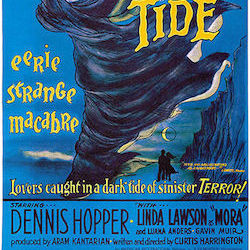
Canonical stature is a fragile and contingent thing, which is why powerful institutions seek to shore up the various canons of art with rankings and plaudits. We’ll play along by asserting that one of our favorite “B” movies was originally screened by Henri Langlois at the Cinematheque française with Georges Franju in attendance. Night Tide (1961) was an unlikely contender for this particular honor—shot guerrilla style on an estimated $35,000 budget, and intended, by its distributors at least, for a wider, less demanding audience seeking mostly air-conditioned escapism.
With its hinky cast—nonfictional witch, Marjorie Cameron; erstwhile muse to surrealist filmmaker Jean Cocteau, the undersung Babette who usually appears en travesti; and lecherous, booze-addled, fresh-faced Hollywood castoff Dennis Hopper—Night Tide invades the drive-in. A tarot reading at the film’s heart gives Marjorie Eaton her time to shine, traipsing into nickel-and-dime divination from her former life as a painter of Navajo religious ceremonies. Linda Lawson might have issued from an etching by Odilon Redon, with her raven locks and spiritual eyes, our resident sideshow mermaid. Not surprisingly and despite such gentle segues, the film itself traveled a rocky road from festivals to paying venues.
Night Tide had spent three years languishing in the can when distributor Roger Corman smuggled the unlikely masterwork into public consciousness, another of his now legendary mitzvahs to art. And the sleazy-sounding double bills that resulted also unleashed an aberrant wonder: the movie’s compact leading man, a force previously held captive by the studio system—looking, here, like some homunculus refugee from the Fifties USA. Dennis Hopper, in his first starring role, would later recall that it represented his first "aesthetic impact" on film since his earlier appearances in more mainstream productions such as Rebel Without a Cause and Giant had denied him meaningful outlets for collaboration.
It’s the presence of its featured players—certainly not their star power—that lends the film its haunting and enduring legacy, and elevates the term “cult classic” to its rightful place in the pantheon of cinema. But we argue that Night Tide remains outside these exclusive parameters—upholding an elsewhere-ness that defies commercial, if not strictly canonical, logic. Curtis Harrington’s first feature film escapes taxonomy, typology or genre—gets away—fueling itself on acts of solidarity instead. If Hopper contributes his dreamy aura, then Corman rescues the seemingly doomed project by re-negotiating the terms of a defaulted loan to the film lab company that was preventing the film’s initial release. His generous risk birthed a movie monument that would add Harrington’s name to a growing collection of talent midwifed by the visionary schlockmeister responsible for nursing the auteurs of post-war American cinema. And here we enter a production history as gossamery as Night Tide itself.
Unlike his counterparts entrenched within the studio system, Harrington was an artist -- i.e. a Hollywood anachronism, with aristocratic graces and a viewfinder trained on the unseen. We see Harrington as Georges Méliès reborn with a queer eye, casting precisely the same showman’s metaphysics that spawned cinema onto nature. By the time moving pictures were invented, artists were moving away from a bloodless representational ethos and excavating more primordial sources for inspiration. The early stirrings of what surrealist impresario André Breton would later proclaim: “Beauty will be CONVULSIVE or it will not be at all.”
Harrington owned a pair of Judy Garland’s emerald slippers, and according to horror queen/cult icon Barbara Steele, also amassed an eclectic array of human specimens: “Marlene Dietrich, Gore Vidal, Russian alchemists, holistic healers from Normandy, witches from Wales, mimes from Paris, directors from everywhere, writers from everywhere and beautiful men from everywhere.” On a hastily constructed Malibu boardwalk, Hopper would be in his milieu among the eccentric denizens of California’s artistic underground—most notably, Harrington himself, a feral Victorian mountebank of a director who slept among mummified bats, practiced Satanic rites, and hosted elaborate and squalid dinner parties. One could almost picture the mostly television director in his twilight years as Roman Castavet of Rosemary’s Baby; a spellbinding raconteur with a carny’s flair for embellishment and enticement. Enthralled by the dark gnosticism of Edgar Allan Poe that had started when the aspiring 16-year-old auteur mounted a nine-minute long production of The Fall of the House of Usher (1942), Harrington would embark on a checkered film career that combined his occult passions with the quotidian demands of securing steady employment. Night Tide, a humble matinee feature whose esoteric underpinnings would spawn subsequent generations of admirers, united the competing forces of art and commerce that Harrington would struggle with throughout his career. Like Méliès, Harrington pointed his kinetic device towards the more preternatural aspects of early motion pictures to seek out the ‘divine spark’ that Gnostics attribute to transcendence, and the necessary element to achieve that immortal leap into the unknown. What hidden meanings and unspeakable acts Poe had seized upon in his writing were brought infernally to life with a mechanical sleight-of-hand. It was finally time for crepuscular light, beamed through silver salts to illuminate otherworldly and other-thinking subjects.
By the time Harrington had embarked on his feature film debut, a more muscular celluloid mythology based on America’s proven exceptionalism was in full force, taking on a brutalist monotone cast in keeping with the steely-eyed, square-jawed men at the helm of a nascent super-power, consigning its more feminine preoccupations to the dusty vaults where celluloid is devoured by its own nitrate. Harrington would resurrect the convulsive aspects of his chosen vocation and embed them deep within the monochrome canvas he’d been allotted for his first venture into feature filmmaking, and combine them with the more rational aspects of so-called realism. In the romantic re-telling of a familiar myth, Harrington was remaining true to gnostic roots and the distinctly poetic language used to express its cosmological features.
In Night Tide, Harrington would map the metaphysical terrain that held up Usher’s cursed edifice as a blueprint for his own work that similarly explored the intertwined duality of the natural and the supernatural. The visible cracks that reveal a fatal structural weakness and a loss of sanity in both Roderick Usher and his doomed estate are evident in Night Tide’s conflicted heroine compelled to choose between her own foretold death underwater, or a worse fate for those who fall in love with her earthly human form.
A young sailor (Dennis Hopper) strolling the boardwalks of Malibu while on shore leave offers the viewer an opening glimpse into the film’s metaphysical wormhole, and a not so subtle hint of the director’s queer eye, stalking his virginal prey in the viewfinder. A beachfront entertainment venue is, after all, where one would casually encounter soothsayers and murderers, sea witches and perverts, as the guileless Johnny does, seemingly oblivious to the surrealist elements of his surroundings as he makes his way on land.
Harrington’s carnival-themed underworld is both imaginatively and convincingly presented as a quaint slice of post-war America, effortlessly dovetailing with his intended drive-in audience’s expectations of grind house with a dash of glamor—not to mention his own avant-garde leanings, which remain firmly intact despite Night Tide’s outwardly conventional construction and narrative.
Harrington is able to present this juxtaposition of kitsch Americana and the queer arcana of his occult fascinations. Indeed, Night Tide’s lamb-to-the-slaughter protagonist could have wandered off the set of Fireworks, Kenneth Anger’s 1947 homoerotic short film about a 17-year-old’s sadomasochistic fantasies involving gang rape by leathernecks.
Anger would later sum up his earliest existing film as “A dissatisfied dreamer awakes, goes out in the night seeking a ‘light’ and is drawn through the needle’s eye. A dream of a dream, he returns to bed less empty than before.” Harrington (a frequent collaborator of Anger in his youth) seems to have re-worked Fireworks, or at least its underlying queer aesthetic into a commercially viable feature film that explores his own life long occult fascinations.
Both Anger and his former protégé would view the invocation of evil as a necessary step towards the attainment of a higher level of consciousness. Harrington coaxed a more familiar story from the myths and archetypes that informed his unworldly views for a wider audience; a move that would be later interpreted by sundry cohorts as selling out. Still, Night Tide shares a thematic kinship with Anger’s more obtusely artistic output as acknowledged by the surviving occultist, who confirmed this unholy covenant at Harrington’s funeral by kissing his dead friend on the lips as he laid in his open coffin.
The hokey innocence of Dennis Hopper as Johnny Drake in his tight, white sailor suit casts a homoerotic hue on the impulses that compel him to navigate a treacherous dreamscape to satisfy a carnal longing, just as Anger’s dissatisfied dreamer obeys the implicit commands of an unspeakable other to seek out forbidden pleasures.
As he makes his way on land, the solitary, adventure-seeking Johnny will be lured into a waiting photo booth, his features slightly menacing behind its flimsy curtain, and brightly smiling a second later as the flash illuminates them. Johnny has entered a realm where intersecting worlds collide, delineating light from shadow, consciousness from unconsciousness. The young sailor’s maiden voyage into the uncharted waters of his subconscious is made evident in the contrasting interplay captured by the camera, where predator and prey overlap in darkness. Here, too, we get a prescient preview of the deranged psychopath Hopper would subsequently personify in later roles, most significantly as the oxygen deprived Frank of Blue Velvet—a man who seems to be drowning out of water. But here, Hopper convincingly (and touchingly) portrays a wide-eyed naïf, still unsteady on his sea legs as he negotiates dry land.
As a variation of Anger’s lucid dreamer in Fireworks (and later Jeffrey of Blue Velvet) Johnny will have abandoned himself quite literally (as his departing shadow on a carnival pavilion suggests, before its host blithely follows) to his own suppressed sexual urges; a force that eventually compels him towards denouement.
Moments later, inside the Blue Grotto where a flute-led jazz combo is in progress, Johnny spots a beautiful young woman (Linda Lawson) seated directly across from him. Her restrained and almost involuntary physical response to the music mimic his own, offering the first indication of a gender 'other' residing in Johnny; an entombed apparition cleaved from the sub-conscious and projected into his line of vision. Roderick and Madeline Usher loom large in Harrington’s screenplay and Usher’s trans themes lurk invisibly in the subtext. Harrington is arguably heir apparent to Poe’s vacated throne, pursuing similar clue-laden paths and exploring the dual nature of human and the primordial creature just beneath the surface poised to devour its host.
The near literal strains of seductive Pan pipes buoyed by the ‘voodoo’ percussion sets the stage for Harrington’s reworking of the ancient legend of sea-based seductresses and the sailors they lure to their graves.
Marjorie Cameron (or ‘Cameron’ as she is referred to in the opening credits) makes a startling entrance into The Blue Grotto as an elder of a lost tribe of mermaids seeking the return of an errant ‘mermaid’ to her rightful place in the sea. Cameron, a controversial fixture in L.A.’s bohemian circles and one-time Scarlet Women in the mold of Aleister Crowley’s profane muses, would later appear in Anger’s The Inauguration of the Pleasure Dome, and as the subject of Harrington’s short documentary The Wormwood Star (1956).
The inclusion of a bonafide witch, along with a host of less apparent occult/avant-garde figures, is further evidence of Night Tide’s true aspirations and its filmmaker’s subversive intent to sneak an art-house film into the drive-in, and introduce its audiences to the heretical doctrine that had spawned a new generation of occult visionaries influenced by Edgar Allan Poe. Decades later, David Lynch would carry that proverbial torch, further illuminating the writhing, creature-infested realm underlying innocence.
Johnny approaches the young woman who rebuffs his attempts at conversation, seemingly entranced by the music, but allows him to sit, anyway. Soon they are startled by the presence of a striking middle-aged woman (‘Cameron’) who speaks to Johnny’s companion Mora in a strange tongue. Mora insists that she has never met the woman before, nor understands her, but makes a fearful dash from the club as Johnny follows her, eventually gaining her trust and an invitation the following day for breakfast.
Mora lives in a garret atop the carousal pavilion at the boardwalk carnival where she works in one of the side show attractions as a “mermaid.” Arriving early for their arranged breakfast, her eager suitor strikes up a conversation with the man who runs the Merry-Go-Round with his granddaughter, Ellen (Luanna Anders). Their trepidation at the prospecting Johnny becoming intimately acquainted with their beautiful tenant is apparent to all except Johnny himself, who is even more oblivious to Ellen’s wholesome and less striking charms. Even her name evokes the flat earth, soul-crushing sensibilities of home and hearth. Ellen Sands is earthbound Virgo eclipsed by an ascendent Pisces. (Anders would have to subordinate her own sex appeal to play this mostly thankless “good girl” role. She would be unrecognizable a few years later as a more brazenly erotic presence in Easy Rider, helping to define the Vietnam war counterculture era.)
As Johnny ascends the narrow staircase leading to Mora’s sunlit, nautical-themed apartment, he almost collides with a punter making a visibly embarrassed retreat from the upper floor of the carousel pavilion. Is Johnny unknowingly entering into a realm of vice and could Mora herself be a source of corruption? Her virtue is further called into question when she not so subtly asks Johnny if he has ever eaten sea urchin, comparing it to “pomegranate” lest her guest fails to register the innuendo that is as glaring as the raw kipper on his breakfast plate. Johnny admits that he has never eaten the slippery delicacy but “would like to try.” Moments later, Mora’s hand in close-up is stroking the quivering neck of a seagull she has lured over with a freshly caught fish, sealing their carnal bond.
Their subsequent courtship will be marred by an ongoing police investigation into the mysterious deaths of Mora’s former boyfriends, and her insistence that she is being pursued by a sea witch, seeking the errant mermaid’s return to her own dying tribe. Her mysterious stalker will make another unwelcome entrance after her first appearance in the Blue Grotto—this time at an outdoor shindig where the free-spirited young woman reluctantly obliges the gathered locals who urge her to dance. The sight of ‘Cameron’ observing her in the distance causes the frenzied, seemingly spellbound dancer to collapse, setting off a chain of events that will force Johnny to further question her motives and his own sanity.
Mora’s near death encounter through dance is an homage of sorts to another early Harrington collaborator and occult practitioner. Experimental filmmaker Maya Deren had authored several essays on the ecstatic religious elements of dance and possession, and later went on to document her experiences in Haiti taking part in ‘Voudon’ rituals that would be the basis of a book and a posthumously released documentary both titled Divine Horsemen: The Living Gods of Haiti. Note the Caribbean drummers whose ‘unnatural’ presence, in stark contrast to the more typical Malibu beach party celebrants, hint at the influence of black magic impelling the convulsive, near heart-stopping movements that eventually overtake her ‘exotic’ interpretive dance.
The opening sequence of Divine Horsemen includes a woodblock mermaid figure superimposed over a ‘Voudon’ dancer. The significance of this particular motif was likely known to Harrington, a devotee of this early pioneer of experimental American cinema. Deren herself appeared as a mermaid-like figure washed ashore in At Land (1947) who pursues a series of fragmented ‘selves’ across a wild, desolate coastline. Lawson with her untamed black hair and bare feet could be a body double of Deren’s elemental entity traversing unfamiliar physical terrain to find a way back to herself.
Mora’s insistence that she is being shadowed by a malevolent force directly connected to her mysterious birth on a Greek Island and curious upbringing as a sideshow attraction compel Johnny to investigate her paranoid claims, hoping to allay her fears with a logical explanation for them. The sea witch (or now figment of his imagination) will guide the sleuthing sailor into a desolate, mostly Mexican neighborhood where her departing figure will strand him—right at the doorstep of the jovial former sea captain who employs Mora in his tent show as a captive, “living, breathing mermaid.”
The British officer turned carnie barker is in a snoring stupor when Johnny first encounters him, snapping unconsciously into action to give a rote spiel on the wonders that await inside his tent. Muir balances Mudock’s feigned buffoonery with a slightly sinister edge. When Johnny arrives at his doorstep to find out more about the ongoing police investigation into her previous boyfriend’s deaths, the captain’s effusive hospitality takes on a decidedly darker tone when he guides his visitor to his liquor/curio cabinet where a severed hand in formaldehyde, “a little Arabian souvenir,” is cunningly placed where Johnny’s will see it. The spooky appendage serves as a reminder to Mora’s latest suitor of the punishments in store for a thief.
Captain Murdock’s Venice beach hacienda is yet another one of Night Tide’s deviant jolts: a fully fleshed out character in itself that speaks of its well-travelled tenant’s exotic and forbidden appetites. The dark, symbol-inscribed temple Johnny has entered at 777 Baabek Lane could be a brick-and-mortar portal into this mythic, mermaid-populated dimension that Johnny’s booze-soaked host thunderously defends as real.
Before falling into another involuntary slumber, Murdock will try to convince Johnny that while he and Mora merely stage a sideshow illusion, “Things happen in this world”—or, more to the point, Mora’s belief that she is a sea creature is grounded in fact.
Murdock’s business card that Johnny handily has in his pocket while tailing his dramatically kohl-eyed mark is oddly inscribed with an address more likely to be an ancient Phoenician temple of human sacrifice (Baalbek) than a Venice Beach bungalow. A lingering camera close-up offers another tantalizing, occult-themed puzzle piece—or perhaps a deliberate Kabbalah inspired MacGuffin. The significance of numbers as the underlying components for uniting the nebulous and intangible contents of the mind with the more inert, gravity bound matter, existing outside it, as the ancient Hebrews believed, wouldn’t have been lost on Night Tide’s mystically-minded helmer. Mora’s explicitly expressed disdain for Johnny’s view of the world as a rationally ordered, measurable entity that could be mathematically explained, reinforces Harrington’s world view, his love of Poe, and those French Symbolist artists who interpreted him.
In Odilon Redon’s Germination (1879), a wan, baleful, free-floating arabesque of heads of indeterminate gender suggests either a linear, ascending involution, or a terrifying descent from an unlit celestial void into a bottomless pit of an all-too-human, devolving identity. Redon’s disembodied heads gradually take on more human characteristics, culminating into a black-haloed portrait in profile. The cosmos of Redon’s etching is governed by an unexplained, inexplicable moral sentience, which absorbs the power of conventional light. Thus black is responsible for building its essential form, while glimmers of white, hovering above and below, prove ever elusive; registering as somehow elsewhere, beyond the otherwise tenebrous unity of the picture plane.
Night Tide has its own unsettling dimensions, of course, this black-and-white boardwalk where astral, egalitarian bums want to tip-toe; and, somehow, practically all of them do. Not a movie but an ever-becoming place, crammed into low-budget cosmogenesis unto eternity. We won’t discuss the ending here, since it hasn’t happened yet.
by The Lumière Sisters
Special thanks to Danny Kasman and David Cairns
4 notes
·
View notes
Text
The Cannibal Text Or
The Homestuck Epilogue(s) Happened and I’m Gonna Write About That
When we speak of the production of the meta-narrative, that is, of the text which is aware of itself, there emerges a question regarding the text’s ideology of itself. All text is ideological - all production is - but the standard model of textual ideology is outward facing - an interpretation of material reality. The meta-narrative distinguishes itself by explicitly engaging in a discursive ideology which constructs itself as a unified subject/object complex. The text emerges as an act of self-interpretation and as the material which is interpreted. I explore this process in the context of fan works in the essay Opposed Meanings in Detective Pony, but here I will elaborate on further principles regarding the application of a critical schema to the “canonical” meta-text of the epilogue(s).
This process of self-interpretation reveals a secondary ideological framework which I will term the meta-ideology. This meta-ideology can manifest itself as either a direct commentary on the text, from within the text (”breaking the fourth wall”) or by introducing secondary paratextual conceits (Pale Fire’s footnotes, or The Blair Witch Project’s persistent VHS-aesthetic framing). These modes of meta-commentary are are not mutually exclusive: Homestuck, our primary subject, blends the two frequently. Fundamentally, para-text covers a category of narrative conceits which comprise a mode of communication that is pragmatically distinct from the standard narrative convention. For a mundane example of this, we can look to Bram Stoker’s Dracula, which utilizes letters, diary entries, and newspaper clippings to communicate its story. These para-textual features form a passive commentary on the narrative they convey. Though para-text does not explicitly recognize itself as an interpreted object, its employment implies a consideration of audience that is not present in naïve, or traditionally expository, texts. Manifest meta-narrative, broadly “breaking the fourth wall”, comprises those texts which acknowledge their positions as fictional or otherwise textual works. This can range from the incidental or comedic (Scream commenting on genre tropes) to the fundamental or paradigmatic (Six Characters in Search of an Author and its play-within-a-play).
Using this basic organizational framework, I will make an attempt to analyze the meta-ideology of the epilogue(s), with reference, where appropriate, to the “body” of the work, being the comic itself. This will not comprise a value judgement, and will not be a commentary on the validity of the text, except insofar as canonical validity is destabilized within the text itself.
I will begin with the technical features of the epilogue(s), focusing particularly on the paratextual techniques employed and their contrast with the “body”. The epilogue(s) are primarily conveyed through traditional expository text in the 2nd and 3rd person. This is interspersed with frequent conversation formatted in the style of pesterlogs/tagged speakers, typical of the “body”. The epilogue(s) differ, then, from the “body” by employing the 3rd person frequently (where the “body” almost exclusively used 2nd) and in eschewing visual representation entirely. Additionally, the epilogue(s) introduced one innovative paratextual feature, in the form of a frontispiece designed to resemble an AO3 descriptor page. I categorize this innovation as paratextual, owing to its lack of manifestation in the narrative proper. This paratextual feature accomplishes two pieces of meta-ideological work: first, it destabilizes the concept of “canonicity”, which normally we would assume to be innate and unvarying, by recalling a fanfiction site, and second, by prefacing the epilogue(s) (along with the epilogue(s) being hosted on a separate section of the site), it introduces a discontinuity in time/canon which is integral to later manifested ideology. As for the PoV and medium changes, those also play a role in reinforcing the meta-ideology, but do not, alone, imply a meta-ideological commentary.
When reading the epilogue(s) we are really considering two interlaced narratives which share three chapters of prologue, and trace their differences to a binary decision made by what passes for our protagonist: Meat or Candy? Within this prologue, Rose gives us a principle which may guide our broader interpretation of the epilogue(s) meta-ideology. Rose gives an expository monologue on the supposed conflict of the story, concerning the degree to which the story remains canon, defined as an unfixed attribute delineated by degrees of truth, relevancy, and essentiality. The latter two appear, per Rose’s examples, to be indistinguishable, but truth is distinguished by acting as an indicator of “canonicity”, conditioned by relevance/essentiality. What is true and relevant/essential is canon, while what is true but not relevant/essential is outside of canon, but not necessarily apart from it (”conditionally true”). Finally, non-canon events have no truth, but may still be relevant/essential, existing on an imaginary axis (or, one might suppose, in “fanon”). This is the framework that the epilogue(s) invoke to frame themselves, but it is not one that the narrative intuitively supports. As readers we expect one of two things from a story: an objective accounting of fact, or the motivated retelling of a particular character. Documentary or unreliable narrator. The epilogue(s) embrace neither.
Let’s begin with ‘Meat’: at first it appears to be an objective 2nd person narration, with John as the receiving subject. Later, it is revealed that Dirk has been narrating the the entire first half. For the remainder of the story, he competes for narrative control with Calliope. Dirk is not an unreliable narrator in the traditional sense, as his descriptions are shown to be factually accurate, at least insofar as physical action is concerned. In fact, Dirk’s narration exerts a degree of directive control over the story, compelling characters to act in ways they otherwise would not have. Calliope, while wielding a similar power, avoids utilizing it, instead opting for pure description. But pure relative to what? That is, when Rose speaks of canon, what are these events relevant/essential to? Does Dirk’s description presuppose the actions it describes a la mind control, or is it a more privileged control, essentially narrative in nature?
The answer I propose is that, in-universe, there exists, under the typical Homestuck complications, a purported objective reality against which truth is judged. Relevance/essentiality, on the other hand, only make sense as concepts to us, the privileged audience. The epilogue(s) defy the binary of reliable/unreliable narration because the conceit of narrativity itself is known to the characters within the story, and has an effect on their subjective reality. ‘Meat’ deconstructs the viability of its own abstraction in-universe, by framing itself as a viewed text, with a privileged viewership. (Note that privileged here refers to the position of a generic viewer relative to the narrative, receiving the recognition of the narrating characters, but privy to the competition between them as well.) This privileged viewership is what allows Dirk to conceive of himself in terms of a ‘villainous’ arc; whether this awareness is actual (the character aware of a real viewership) or megalomaniacal (a delusional fantasy on the part of the character) is irrelevant, since the conceit of the privileged viewership is reified by Dirk and Calliope’s belief in it.
On to ‘Candy’. Though I have chosen to deal with it second, this is not meaningful. The works may have been read in any order, and I myself read them piecemeal, jumping back and forth where I thought appropriate. What to say about ‘Candy’? It is (non)-canonically inconsequential. It is exposited factually, and at first appears to be generically narrated, though it is later revealed that Calliope acts as an aloof narrator. A great many things happen which can be described uncharitably as ‘fanficcy’. John, refusing the call to action, struggles to find meaning in this version of Earth C. What is this story’s role in reinforcing the meta-ideology? It does not deal with profound questions of canonicity or narrative authority, as ‘Meat’ does. Even Rose, our central expositor, drops these themes wholesale. Dirk kills himself, unable to conceive of living in an inessential/irrelevant timeline.
I said earlier that ‘Meat’ positioned itself as a viewed text, with the attention of the privileged viewership as the arbiter of relevance/essentiality. ‘Candy’ is the answer to the question of what it is relevant/essential to. There is no objective reality to which ‘Meat’ refers, but in juxtaposition with ‘Candy’ it is given a sense of relative weight. ‘Meat’ and ‘Candy’ form a semiotic pair with “Canonicity” as the common referent, ‘Meat’ being a positive/manifest aspect, and ‘Candy’ being its negative/absent aspect. ‘Meat’, being manifest, has more to say about the actual content of the meta-ideology regarding “canonicity”, but just as sheep and mutton derive their meaning from a contrastive différance, so ‘Meat’ depends on the contrastive position of ‘Candy’ to give meaning to the proposed meta-ideology.
This brings me to the notion of The Cannibal Text. While ‘Meat’ and ‘Candy’ are both necessary to the construction of their contrastive différance, their roles in it are not equivalent. In Opposed Meanings in Detective Pony I described a derivational relationship between the two Detective Ponys in which one took an active role, and one a passive role. The epilogue(s) present a similar contrast. ‘Meat’ does not only derive its relevance/essentiality from ‘Candy’, but also destroys what relevance/essentiality ‘Candy’ may otherwise have had alone. We are presented with two timelines, in a story whose “body” insists on a single valid timeline (all others being doomed or overwritten). Though ‘Candy’ avoids either of these fates, it is nevertheless positioned as the “wrong” timeline, in other words, one which is un-canon. It is only through the interplay between ‘Meat’ and ‘Candy’ that the meta-ideology of “canonicity” can emerge and be applied meaningfully to the text. The text consumes itself, and in consuming itself, is reified. The act of consumption invalidates one timeline to give narrative weight to the other. It is a Cannibal Text, which in commenting on its own position relative to a privileged viewership, must justify its “objective” meaning with the symbolic sacrifice of that which is merely imagined. “Fanon”/’Candy’ is both necessary to contrastively reify canon, and utterly alien to it, having its purported meaning destroyed by the mere juxtaposition of the positive, ‘Meaty’ signifier.
#homestuck#upd8#detective pony#homestuck epilogue#rose lalonde#dirk strider#john egbert#i hate myself for writing this#and i hope you will too
18 notes
·
View notes